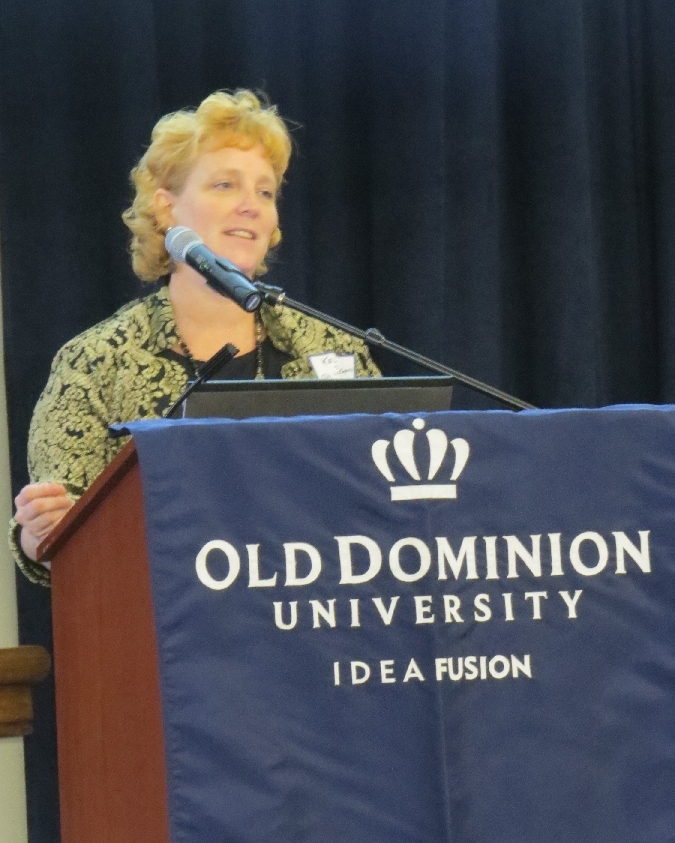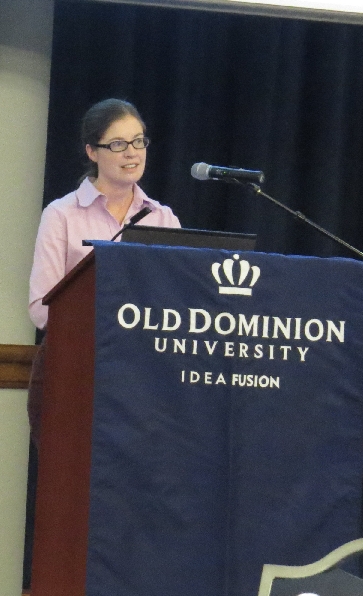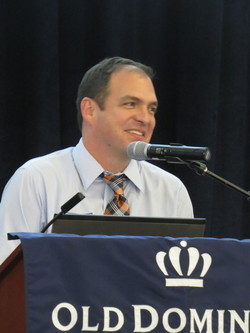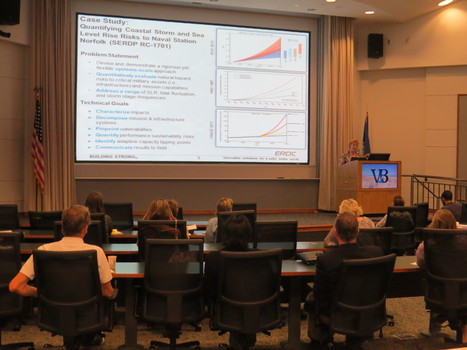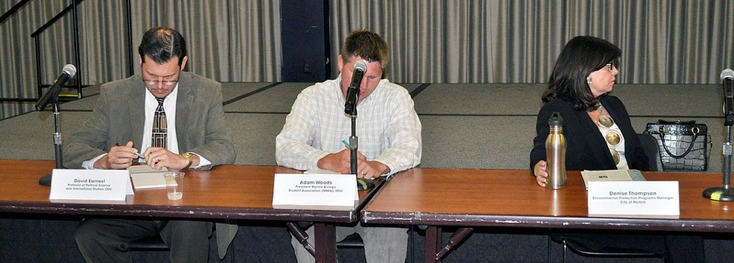NEWS
[May 31, 2017] Flood Risk Management: The WWF published “Natural and Nature-Based Flood Management: A Green Guide”, which introduces an integrated framework for flood management, drawing on policy, green infrastructure and conventional engineering to help communities adapt and better manage growing flood risk. Read the guide ...
[April 21, 2017] Achieving Environmental equity: A community roundtable organized by the Urban Sustainability and Equity Center in Richmond, Virgina on May 1, 2017, 6:00-8:00 PM, will discuss local heat island patterns in the City of Richmond. Registration is available at https://www.usec-virginia.org/events/.
[April 20, 2017] Trillions of plastic pieces are polluting the oceans: An article in the New York Times reports that trillions of plastic bits are swept up by currents and are littering Arctic waters. Most of this is coming from the North Atlantic. The consequences for marine ecosystem are likely to be severe.
[February 10, 2017] How to be successful under unfavorable conditions?: In a new column in ApogeoSpatial, Hans-Peter Plag finds that the Sustainable Development Goals (SDGs) of the 2030 Agenda of the United Nations came in a world not prepared for them and he addresses the question how they can be successful under these umfavorable conditions.
[February 7, 2017] The crack in Larsen C is growing: A NYT article by Jugel Patel, an ODU student, illustrates the rapid development of the large crack in the Larsen C ice shelf. If the crack continues to grow at current speed, a large paret of the ice shelf will break of in the next few month.
|
[September 23, 2016] Greenland Ice Sheet is melting faster than previously thought: A study by Khan et al. (2016) published in Science Advances estimates that the mass loss of the Greenland ice sheet is significantly larger than previous estmates. The new estimate uses observations from a GPS network around the ice sheet to compensate for the crustal motion resulting from the mass changes. |
|
[September 9, 2016] Rapid ocean warming may be the greatest hidden challenge of our generation: A new scientific report published by IUCN finds that oceans are taling 93% of the additional heat stored by the planet due to global warming and this is having a severe impact on the marine biosphere. Read the report or Executive Summary. An article in The Guardian comments on the report. |
|
[August 20, 2016] Climate Change Mitigation Through Small Families: Travis Rieder, philospher at John Hopkins University in Baltimore argues for a moral need to have no children or at least small families in order to mitigate climate change and keep the number of people impacted smaller, reports Jennifer Ludden in an article for NPR. |
|
[August 11, 2016] Sea Level Rise Acceleration Could Soon be Detectable: An article in The Guardian by John Abraham discusses a recent Nature paper by John Fasullo et al., which claims that accelerated sea level rise should be detectable in the coming decade. |
|
[August 8, 2016] Wasting Resources May be the Biggest Threat: As reported in an article in The Guardian, The Scottish Environment Agency finds that wasting resources may be the biggest threat for the planet and requires that industry and farmers cut energy use, greenhouse gas emissions, and resource use. |
|
[August 8, 2016] Many Countries Need Help for Adaptation to Climate Change: An Op-Ed in the NYT makes that case that many of the poorer countries will need significant help adapting to climate change and points out that the more wealthy countries need to provide this help. |
|
[August 5, 2016] Anthrax activated by unusually high temperatures: As reported in an article by Alec George in The Guardian, unusually high temeratures as high as 95F are the most likely cause of an Anthrax outbreak in northern Russia 75 years after the last outbreak. The outbreak is considered to be linked climate change, which has led to a larger than the global average warming in the Arctic. |
|
[August 4, 2016] Significant Impact of Sea Level Rise on Coastal Real-Estate: George Dvorsky reports in a Gizmodo blog that a study done by the company Zillow using their real estate database shows that on the order of $1 Trillion of U.S. residential real-estate value is at risk of being innundated if sea level rises six feet. For this sea-level rise scenario, they find that 36 U.S. cities would be completely lost and another 300 U.S. cities would lose at least half of their residential real estate. |
|
[July 29, 2016] Positive feedback between warming and Carbon Dioxide release from the biosphere and soils: In an article in The Guardian, Graham Readfearn summarizes the results reported in a new Nature Geoscience publication on the analysis of Antarctic ice cores, which indicate that there is a positive feedback between higher atmospheric temperatures and the amount of carbon dioxide released by the terrestrial biosphere: “for every 1C of warming, the Earth's plants and soils — the “terrestrial biosphere” — will add carbon dioxide to the atmosphere to the tune of about 20 parts per million.” |
|
[July 28, 2016] With a focus on global temperature data: Greg Jericho, an author normally writing about economy, discusses the trends in global temperature and provides interesting graphs in an article in The Guardian ... |
|
[July 27, 2016] “Climate models predict global warming accurately”: In an article in The Guardian, John Abraham discusses the results of a recent paper authored by Kevin Trenberth, Lijing Cheng, John Abraham and other, which show that climate models give accurate estimates of the global warming rate, including the acceleration after 1992. The current warming rate is equivalent to 5,400 billion 60-Watt light bulbs running continously. Note: The current rate at which energy is stored in atmosphere and oceans is roughly twenty times the total global energy usage of humanity of 17.5 Terawatt. |
|
[July 27, 2016] “Global Warming Leads to More Global Warming”: The global environmental impact of air conditioning is already big and expected to get even bigger, an article in Quarz reports. The article refers to a paper published by L. W. Davis and P. J. Gertler in the Proceedings of the National Academy of Science (PNAS). |
|
[July 22, 2016] “Cooler Antarctic doesn't mean less sea level rise”: A recent paper by Turner et al. published in Nature finds that the air temperature over parts of the Antarctic Peninsula has been degreasing over recent years and that this is caused by variations in the mean wind field. However, the warming ocean could still lead to increased ice melt. |
|
[July 21, 2016] “Costs of Climate Change are projected to rise a lot”: As reported in an article published in Quarz, a new study projects that the cost of the rising heat for the global economy could reach $2 trillion by 2030. Most of the costs are associated with outside construction and farmwork not being possible, and the main impact would be felt by the poor and in the developing world. |
|
[July 20, 2016] Rethinking how we live in the coastal zone: ODU professor and director of MARI, Hans-Peter Plag was quoted in an article by Paulette Perhach in the New York Times saying that “living in the coastal zone is extremely important for us. So we need to find a way to live in the coastal zone, but we cannot assume that sea level is stable.” |
|
[July 20, 2016] June 2016 is the 14th months in a row setting a temperature record: Micheal Slezak in The Guardian comments on the June temperature data released by NASA and NOAA, which shows that June 2016 was the hotest June since records began in 1880 and the 14th months in a row of record-setting months. Read the article ... |
|
[July 6, 2016] “Protecting and saving or preparing to leave?”: An article by Jon Gertner published today in the New York Times discusses the future of Tangier Island and raises the question whether the United States should make an effort to save the island from sea level rise. |
|
[July 5, 2016] “Guardian US readers express anger about election debate omitting climate change”: Ed Pilkington and Mona Chalabi report in an article in the Guardian US on a poll which “revealed anger of voters as election year debate fails to deal with concerns over the gathering global disaster. Asked to identify the “one issue that affects your life you wish the presidential candidates were discussing more,” climate change was the most mentioned issue. However, the 1,385 respondents were strongly skewed towards the Democratic party and supporters of Bernie Sanders. ” |
|
[July 5, 2016] “Growth of Antarctic sea ice likely to be caused by the IPO?”: Chris Mooney discusses in an article a new study by Meehl et al. published in Nature Geosciencesthat finds evidence for the recent growth of the Antarctic sea ice to be caused by a teleconnection with the Interdecadal Pacific Oscillation. |
|
[June 30, 2016] “Science Groups tell Congress that Climate Change is a Threat”: ABC News reports that thirty one of US science organizations sent a letter to Congress emphasizing the threat climate change poses to society. See also the Eurekalert note. The letter is available as pdf. The letter states that “There is strong evidence that ongoing climate change is having broad negative impacts on society, including the global economy, natural resources, and human health. ... The severity of climate change impacts is increasing and is expected to
increase substantially in the coming decades.” |
|
[June 29, 2016] “BREXIT, Climate Change, and the inter-generation theft”: An article published yesterday in The Guardian draws a parallel concerning the generation divide in the BREXIT decision and the willingness to address climate change, and concludes that the young generation will have to carry the brunt of the poor decisions being made by today's older generation. A similar parallel may exist concerning the older generation's decisions of how to adapt to sea level rise. |
|
[June 28, 2016] “Human extinction isn't that unlikely”: An article published on April 29, 2016 in The Atlantic reports that a study by the Global Challenges Foundation and the Global Priorities Project finds that the risk of human extinction is relatively high. A human being is five times more like to die in an extinction event, such as nuclear war, pandemics, climate change, etc., than in a car crash. Model-based studies indicate that the probability of a large climate shift amounting to a global warming of six to ten degrees Celsius by 2100 excceds 3%, and such a shift would very likely lead to mass extinction including a large fraction of humanity. |
|
[May 17, 2016] “Southern Hemisphere also crosses milestone of 440 ppm in atmospheric carbon dioxide”: A communication in The Conversation reports that the atmospheric carbon dioxide content has finally crossed the mark of 400 ppm on the southern hemisphere including Antarctica. The communication projects a continuation of the recent rapid increase towards values that will lead to dangerous increase in global temperature. |
|
[May 16, 2016] “Global temperature continues to rise”: NASA just published the temperature data for April 2016, and - as discussed in an article in the Guardian, this April was the hottest April on record globally — and the seventh month in a row to have broken global temperature records. |
|
[May 14, 2016] “Knowlegde must turn into action”: In the most recent contribution to the column “On the Edge” in ApoGeo Spatial, Hans-Peter Plag discusses the reasons why the knowledge on global change accummulated by humanity does not turn into action to safeguard the Earth's life-support system. |
|
[May 3, 2016] “Vanishing Arctic Sea Ice Accelerates Melting of Greenland Ice Sheet”: Recent studies show that the vanishing Arctic sea ice impacts atmospheric circulation and leads to a blocking that accelerates Greenland ice melt. The latest of these papers finds a significant increase of this effect in recent decades. See the article by Chelsea Harvey in the Washington Post for a discussion. |
|
[May 2, 2016] “More evidence for a rapid melting of the Greenland ice sheet”: A recent study by Schild et al. accepted for publication in Annals of the international glaciological society finds that the processes in the submarine valleys under the Greenland ice sheet are likely going to accelerate the melting of this ice sheet. The study is discussed by Chris Mooney in an article in the Washington Post. |
|
[April 21, 2016] “Sandia Reports provides framework for Resilience assessment”: An Editorial in the Virginan Pilot refers to a recent Sandia Report that establishes a framework for resilience assessments using Norfolk as an example. For a limited range of sea level rise scenarios of 0, 1.5 and 3 feet, the report finds costs for the 100-year flood ranging from $354 million to more than $600 million. |
|
[April 19, 2016] “Towards a new Dark Age”: In an Op-Ed in the New York Times, William B. Gail explains why we are likely to enter a new dark age, where our knowledge of a changed planet is much less advanced than today. He finds this not a desirable legacy to leave for our children. See the Op-Ed ... |
|
[March 30, 2016] “The West Antarctic Ice Sheet may contribute as much as 1 m of sea level rise by 2100”: A new model study which for the first time could reproduce past changes in ice sheets, indicates that the West Antarctic ice sheet might contribute far more than thought previously to sea level rise in this century raising the total sea level rise to more than 2 m . See the article in the New York Times and the research paper. |
|
[March, 2016] “The Antarctic Ice Sheet might be less stable than currently thought”: Several recent studies indicate that the Antarctic ice sheet might have thresholds at CO2 and temperature levels that could trigger instabilities in the not too distant future. The article by Chris Money in the Washington Post summarize the recent findings and includes links to the research papers. |
|
[February 23, 2016] “Seas Are Rising Way Faster Than Any Time in Past 2,800 Years”: This article on sea level rise in ABCNews concludes that present sea level rise is much lower than during almost all of the last three millenia. The article is based on a study led by Robert Kopp published in PNAS. |
|
[February 22, 2016] “Antarctica could be much more vulnerable to melting than we thought”: The article by Chris Mooney in the Washington Post is based on two recent publications by Levy et al. and Gasson et al. showing that the Antactic ice sheet lost a lot of its volume during previous time with atmospheric carbon dioxide being not much higher than today. |
|
[February 11, 2016] Large-scale atmospheric CO2 removal may be necessary but risky: The paper “Emmission reduction: Scrutinize CO2 removal methods” by Phil Williamson is published in Nature on Feb. 10, 2016in Nature discussed the options for large-scale removal of atmospheric CO2 and finds all option highly risky. Read the press release. |
|
[January 30, 2016] “Addressing subsidence in Hampton Roads”: In an article in the Virginian Pilot titled “Could your sinks and toilets fight sea-level rise in Hampton Roads?”, Dave Mayfield discusses how cleaned waste water could be used to reduce subsidence in the region. Read the article. |
|
[January 26, 2016] “Report on Impacts of Sea Level Rise and Storm Surges on Roadways in Hampton Roads”: The HRTPO staff has completed a new draft report, “Sea Level Rise and Storm Surge Impacts to Roadways in Hampton Roads.” The report has been distributed to members of the HRTPO Transportation Technical Advisory Committee. Public review and comment is open through Friday, January 29, 2016. The report is available online at http://www.hrtpo.org/page/public-comment-opportunities/. |
|
[January 23, 2016] Speeding up recovery: Under the auspices of the Rockefeller Foundation, Swiss Re and Veolia are partnering to speed up recovery in the wake of catastrophes and to build the resilience of cities to broader critical risks. Read the press release. |
|
[January 22, 2016] “In Case of Blizzard, Do Nothing”: The opinion piece by David Dudley finds that a blizzard is “the best natural disaster there is.” Very nice reading. |
|
[January 8, 2016] Increasing flooding may impact economic activity in the region: A recent study in Portsmouth indicates that the increasing flooding has the potential to impact curtail future economic opportunities. Quoted from the announcement “The authors report there is a strong perception among residents that future economic opportunities will be curtailed by changing sea levels. Adaptation strategies in response to recurrent flooding fall into three broad categories: retreat, accommodation and protection. A resilient community is one that effectively reduces its vulnerabilities, as Portsmouth and other localities are planning to do.” Read the article ... |
|
[December 27, 2015] “Closing the Chesapeake Bay to fence off storm surges could have many side effects”: In an article by Karl Blankenship in the Bay Journal titled “Walling off Bay to reduce floods would cause deluge of other woes,” the results of research at VIMS are discussed, which indicate that a permanent barrier closing of the Chesapeake Bay could have severe impacts on the ciruclation, water quality and ecosytems in the Bay. |
|
[December 22, 2015] Permafrost Contribution and Impacts on Trees: There are more bad news concerning climate change drivers and impacts. The contribution of permafrost to the forcing of climate change may have been underestimated, as described in an article by Chelsea Harvey in the Washington Post and the impacts of climate change on trees may be devastating, as outlined by Chris Mooney in another article in the Washington Post. |
|
[December 5, 2015] Safeguarding our Life Support System: In a new article in the column “On the Edge” in ApoGEO Spatial, Hans-Peter Plag emphasizes the need to safeguard the Earth's life suport system, on which we and future generations depend. In order to do so, we need to overcome the “immutable truth” that growth is neccesary for a trhiving economy. |
|
[December 1, 2015] The Climate Pledges at COP 21 are Progress, but far from being enough: In an article in the Washington Post, Chris Mooney summarizes comments scientists provided on the climate pledges of many nations made at COP21 in Paris. The scientists he refers to are concerned that the pledges are far from enough to avoid an ice-free planet, which would lead to a large sea level rise with devastating consequences for future generations and severe impacts already over the next few decades. The science he nrefers to is documented in a report prepared by the International Cryosphere Climate Initiative. |
|
[November 25, 2015] The risk of investing in fossil fuels: An article in The Guardian stipulates that a potential climate deal during COP21 could render oil, gas and coal projects worthless and cause the loss of $2 trillions of inverstors' money, primarily in the U.S., Canada, China, and Australia. The article is based on a Report of the Carbon Tracker Initiative. See also the video sumarizing the findings. |
|
[November 24, 2015] 90% of disaster in the last 20 years are weather related: A new report published by UNISDR finds that most recent disasters are related to extreme wetaher events. |
|
[November 24, 2015] New study finds there is no evidence for a global wwarming pause: A study by Levandowsky et al. published in Nature using a NASA dataset finds no evidence for a “pause” in the trend of global warming. The oscillations around the very pronounced warming trend are due to interannual to decadal variations but do not reduce the overall trend of rapid warming. See also the article by Chris Mooney in The Washington Post.
References: Lewandowsky, S., Risbey, J. S., Oreskes, N., 2015. On the definition and identifiability of the alleged “hiatus” in global warming. Nature Scientific Reports, 5, Article number: 16784 (2015), doi:10.1038/srep16784.
| |
|
[November 19, 2015] A Report Card for States At Risk: As a result of the “first-ever national analysis of state-level preparedness for climate-driven threats, ” the web page “States at Risk: America's Preparedness Report Card&dquo; is available. It “is the first-ever quantitative assessment that summarizes the changing nature of key threats, including extreme heat, drought, wildfires, inland flooding, and coastal flooding, and the corresponding levels of preparedness in each of the 50 states. The goal of the Report Card is to help states improve their level of preparedness by recognizing risks from the climate-related threats they face, building an action plan, and implementing this plan.” Visit the Reporting Card at stateatrisk.org ... |
|
[November 18, 2015] First Annual Report of Pilot Project is available: The Hampton Roads Sea Level Rise Preparedness and Resilience Intergovernmental Pilot Project has published it first annual report. This “Phase 1 Report: Accomplishments and Lessons Learned” summarizes the events organized in the frame of the Pilot Projects and the work carried out in the working groups. Download the report ... |
|
[November 16, 2015] Another Greenland glacier enters a rapid melting process: The Zachariae glacier in northeastern Greenland is the latest glacier which started a rapid melting process due to contact with warm ocean water. This process could result in 0.5 m of sea level rise. Read more in the Washington Post article by Chris Mooney ... |
|
[November 13, 2015] Climate Change and Sea level Rise at the Ministerial Summit on Earth Observations: At the Ministerial Summit on Earth observations held on 13 November 2015 in Mexico City, climate change and sea level rise were high on the agenda. Secretary of the Interior, Sally Jewell emphasized the challenge of sea level rise for the U.S. and the world. She also mentioned that she saw the first Monarch butterflies arrive in Mexico the day before the summit.
|
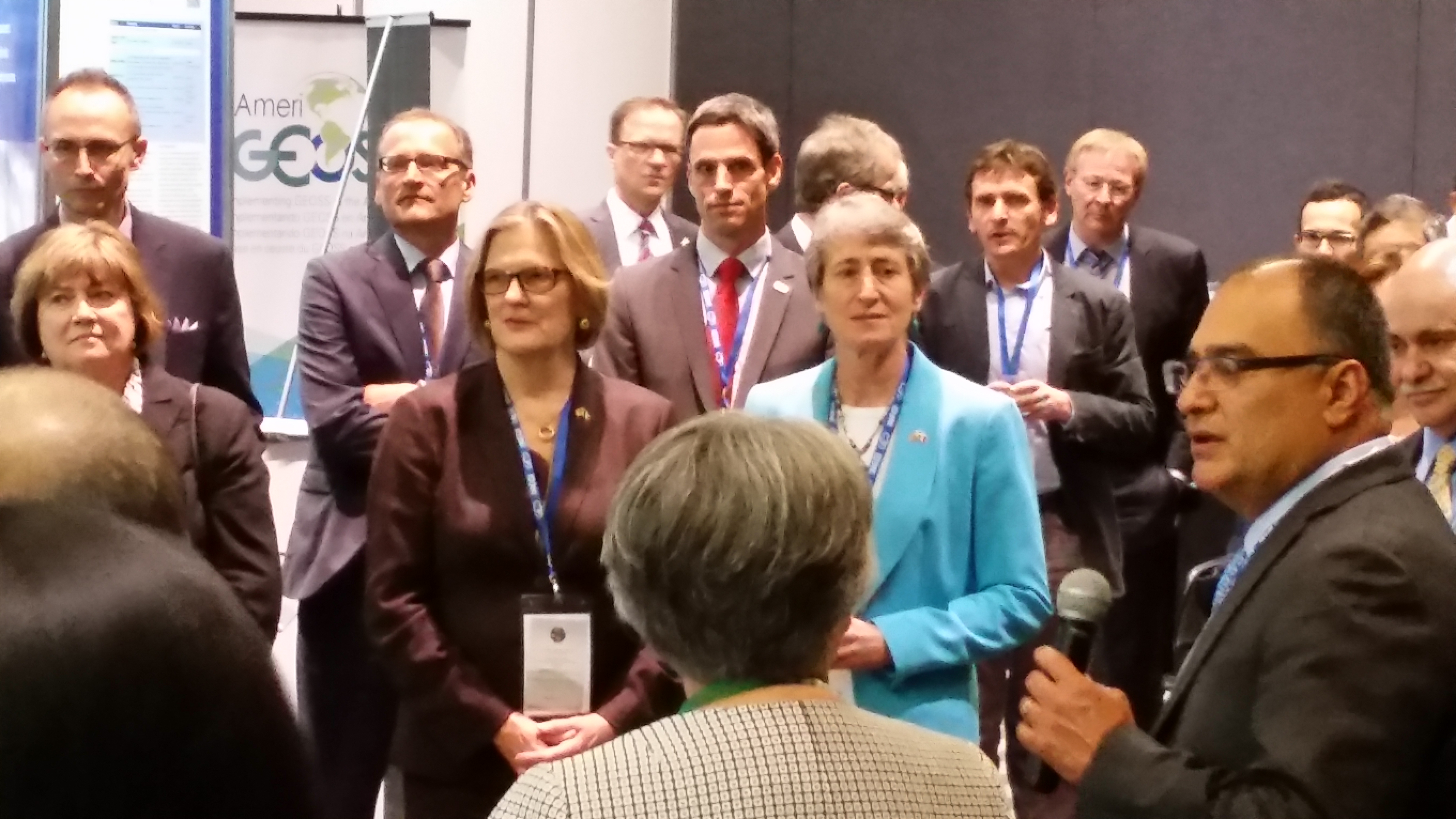 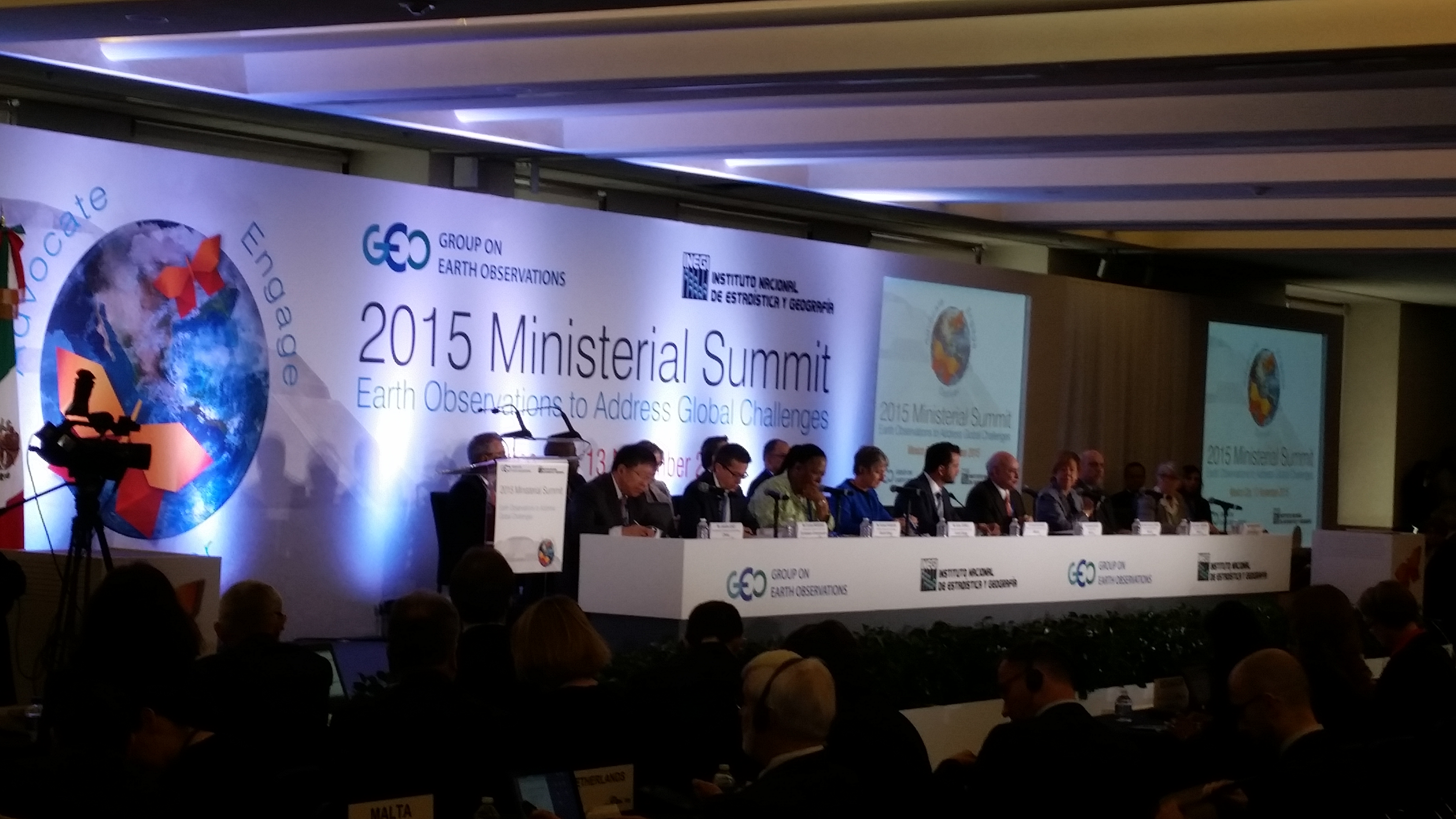
|
|
[November 11, 2015] Secretary of State John Kerry speaks at Old Dominion University: Secretary Kerry visited ODU on November 10, 2015 and provided his Remarks on Climate Change and National Security. He emphasized that we “have to prepare ourselves for the potential social and political consequences that stem from crop failures, water shortages, famine, outbreaks of epidemic disease” and sumarized “long story short, climate change is not just about Bambi; it's about all of us in very personal and important ways.” |
|
[November 10, 2015] The urgent need for climate action: Lord Stern, a leading climate change expert in the U.K., urged Europe to step up its effort to combat climate change and wake up to the urgency of the situation. Before the UN talks in Paris later this month he said that, “In human history it’s a one-off ... and what we map out in the next two decades will be absolutely critical. Whether we can live in our cities — breathe in them, move in them — all of this will be defined by the decisions we take” Read the Guardian article by Juliette Jowit ... |
|
[November 09, 2015] Climate change could increase poverty: A World Bank report finds that climate change could push 100 million into poverty by 2030, as reported in The Guardian and Scientific American. This could counteract the efforts related to the Sustainable Development Goal (SDG) 1: “End poverty in all its forms everywhere.” |
|
[October 30, 2015] Norfolk is Re-Thinking its Future: Facing an uncertain amount of sea level rise with potentially large impacts on the city infrastructure, Norfolk has published a plan for re-thinking its future. Read the article in the Virginian Pilot and/or read the Resilience Strategy document. The document can also be down-loaded. Norfolk's Resilient City page has more information. |
|
[October 28, 2015] The Greenland ice sheet is melting away: The New York Times reports in an amazingly illustrated article about the accelerated melting of the Greenland ice sheet and emphasizes the consequences for sea level rise. Read the article by Coral Davenport, Josh Haner, Larry Buchanan and Derek Watkins ... |
|
[October 27, 2015] Climate Commitments are insufficient and dangerous: A study by the European Commission Joint Research Centre comes to the conclusion that the current climate commitments by 155 countries will lead to a global warming of 3oC, which would be highly dangerous for humanity. Read the press release ... |
|
[October 26, 2015] A big and bad climate story is unfolding in Indonesia: The forest clearing by fire and the peatland fires resulting from draining these areas cause “emissions so voluminous that on several days this year they have surpassed the daily emissions output of the entire U.S. economy.” Read the article by Juliet Eilperin and Chris Mooney ... |
|
[October 15, 2015] Inside ODU reports on a MARI project to train conservation leaders: MARI at ODU has been awarded a grant from the U.S. Fish and Wildlife Service to develop curricula for minors and certificates, as well as a service learning and internships program for conservation leadership under climate change and sea level rise. The project also aims to co-design a reserach agenda addressing the impacts of climate change and sea level rise on conservation. Read the article ...
|
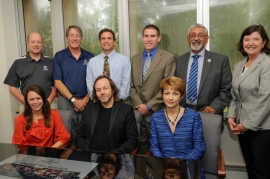
|
The ODU team for a new project on conservation leadership under a Memorandum of Understanding between MARI at ODU and the U.S. Fish and Wildlife Service. Visit the project web page ...
|
|
[October 10, 2015] Stuff happens, for example climate change: In a recent opinion editorial in the New York, Thomas Friedman points out that we have reached a tipping point in terms of reacting to the climate change threat — “except for some of the knuckleheads running to be our next president, which is not a small problem.” He makes reference to the new book ”Big World, Small Planet” by Johan Rockstrom and Mattias Klum, which emphasizes the exceptional stability of the Holocene providing a safe operating space for humanity to develop civilization. The recent rapid changes introduced by humanity may is pushing us across the global boundaries of this safe operating space. |
|
[October 2, 2015] Coastal flooding impacts the region: A sequence of coastal flooding events has been impacting the region. The picture shows ODU students on their way home during the “nuisance flooding” on October 2, 2015. See more pictures of the impacts at the flooding event page ... |

|
|
[September 11, 2015] Has humanity evolved into an extreme hazard?: In his latest column in APOGEO, Hans-Peter Plag compares humanities energy to the energy released by extreme geohazards and asks the question whether the resulting anthropogenic cataclysm makes humanity one of the most extreme hazards that need to be accounted for in disaster risk reduction. |
|
[August 29, 2015] NASA is worried about increased melting of the Greenland ice sheet: In an article in “The Washington Post,” Chris Mooney summarizes a NASA press briefing, at which NASA scientist expressed concern about the increased likelihood of a non-linear increase of ice melt in Greenland, which could accelerate sea level rise significantly. |
|
[August 24, 2015] How long can New Orleans withstand rising seas and sinking lands?: An article by Chris Mooney in “The Washington Post provides a comprehensive overview of the challenges New Orleans faces due to rapidly shifting coastlines and the options and activities to revert the loss of coastal areas and to mitgate the impacts. |
|
[August 17, 2015] The question is how fast sea level rise will rise and by how much: In an article in “The Washington Post, Chris Mooney reviews the extensive discussion of the recent Hansen et al. paper, which found indications that sea level may rise much faster than projected in the last IPCC assessment. Mooney concludes that “the question of just how fast the seas will rise — and by how much — has become one of the most important ones on the planet. |
|
[August 14, 2015] The relevance of Climate Fiction (CliFi) in the societal discourse on climate change: In an article in “The Atlantic, J. K. Ullrich asks whether climate fiction books can save the planet. CliFi, a new literary genre, is increasingly impacting the perception of climate change in a growing fraction of the population. |
|
[August 8, 2015] Vulnerability and risk is on the rise in most river deltas: River deltas offer many advantages to human settlements, and population in many river deltas is rapidly increasing. So are the human impacts and sea level is rising. This is leading to an increase in vulnerability and risk, and increasing costs to protect the human assets in these areas, finds a new study published in Science. The costs for protection and adaptation eventually my exceed the copying capcity of the population in these areas. See also the article by Chris Mooney in the Washington Post. |
|
[August 7, 2015] Cost of disasters caused by natural hazards: The New York Times produced a few short videos comapring the cost of disasters in different regions of the country. You can watch these videos here. |
|
[July 24, 2015] There is a possibility of rapid ice melt, sea level rise and superstorms: The article by Hansen et al. published yesterday in Atmospheric Chenistry and Physics underlines the possibility that a non-linear ice melt caused by climate change will lead to a rapid sea level rise. Depending on the doubling time for ice melt, a large sea level rise might occur in the next 50 to 200 years. The increased influx of fresh water into the polar oceans could cause a larger temperature difference between tropical and polar regions leading to unparalleled superstorms. |
|
[July 21, 2015] New extremes in global temperature A NOAA report shows that June 2015 was the hottest June on record, about 0.12oC higher than the last record, which was June 2014. Both the global land and sea surface temperature set new records, and the first six months of 2015 were the hottest first six months in a year on record. The results are also discussed in an article by Timothy Cama in The Hill. |
|
[July 20, 2015] Scientific climate scenarios indicate the possibility of severe impacts: A paper by Hansen et al. to appear in Atmospheric Chemistry and Physics and discussed in an article by Chris Mooney in the Washington Post considers scenarios that could lead to a rapid large sea level rise. Although many of the details still need to be worked out, the bottom line conclusion, Hansen says, is that sea level rise is “the big impact of human made climate change.” |
|
[June 23, 2015] That is not a good news: global warming get more real: An article published by Bloomberg.com summarizes the findings of the world's top monitoring agencies, which show that the first five months of 2015 are the hotest ever recored. NOAA and the Japan Meteorological Agency both find May to be the hotest May on record, while NASA had it as tied for the second-hottest. Based on a pattern of unusually warm waters in the Pacific Ocean, there is an 85% chance of El Nino persisting through the 2015-2016 winter, and this could easily turn 2015 into the hotest year on record. |
|
[June 22, 2015] Extinction rates are 10 times to more than 100 times higher than normal: In an article in The Guardian, it is reported that the extinction rate in the last 100 years is significantly above the normal extinction rate in pre-industrial time. The article is based on a new study, whihc finds that “rather than the nine extinctions among vertebrates that would be expected to have occurred in normal geological circumstances since 1900, their conservative estimate adds in another 468 extinctions, spread among mammals, birds, reptiles, amphibians and fish. Examples of lost species would include the Yangtze dolphin and the Costa Rica golden toad. Depending on the group, extinction rates are 10 times to more than 100 times higher than normal. A sixth mass extinction, therefore, is beginning. They estimate that it would grow to rival the last great catastrophe of the past, when the dinosaurs and much else died out 65m years ago, in as little as three human lifetimes.” |
|
[June 11, 2015] Why sea Level Rise should scare you: The latest NICHI newsletter communicates “15 Facts About Sea Level Rise That Should Scare the S^*# Out of You;” see
here ... |
|
[June 10, 2015] Last Call for Larsen B: NASA is documenting the final stage of the Larsen B ice shelf, see here ... |
|
[June 4, 2015] No Global Warming Hiatus? NOAA scientists found that what is known as the “global warming hiatus” is due to an instrumental bias resulting from introducing new technologies to measure sea surface temperature, see the Washington Post article by Chris Mooney or the NYT article by Justin Gillis ... |
|
[June 3, 2015] How Greenland surface lakes rapidly drain: The process by which large surface lakes on the Greenland ice sheet can rapidly drain is now better understood, and the process could rapidly increase the melting of ice; see the Washington Post article by Chris Mooney ... |
|
[May 30, 2015] Study underlines the importants of interannual sea level variability: A new study led by ODU scientist Benjamin Hamlington documents the impact of El Nino events on coastal sea level. The study finds that U.S. West Coast sea level can increase by up to 20 cm during strong El Nino events. Read the Scientific Amercian summary of the study... |
|
[May 9, 2015] Humanity's war against fish: In an opinion piece in the New York Times, PAUL GREENBERG and BORIS WORM comment on the war against fish that was probelled by the end of WW2 and the technology and expertise developed during the war. They state: “Taken collectively, the rise of postwar fishing technology meant that the global reported catch rose from some 15 million metric tons at war&srsquo;s end to 85 million metric tons today — the equivalent, in weight, of the entire human population at the turn of the 20th century, removed from the sea each and every year.” Read the article ... |
|
[May 6, 2015] Carbon dioxide crossed the 400 ppm boundary for good: March 2015 was the first month since several million years ago with an average global atmospheric carbon dioxide level above 400 ppm. This is far outside the pre-1900 range of variability determined from 800,000 years of paleo data. This normal range, which covers warm periods and ice ages, is between 170 and 300 ppm. With the current level, humanity has committed to a large increase in global temperature and a huge sea level rise. Read the article by Nick Visser ... |
|
[April 16, 2015] The Story of Virginia's Rising Seas and Sinking Cities: ODU's student newspaper Mace and Crown described the story of sea level rise and its impact on coastal cities in Virginia and finds that these cities are at high risk. Read the article by Jugal Patel ... |
|
[April 3, 2015] Abrupt climate change impacts are happening: The rapid decrease of Arctic sea ice particularly in the summer months is one of the abrupt climate change impacts already taking place. It also is an impact with positive feedback expected to accelerate more over the near future. See impressive graphics created by Kennedy Elliott and read the article by Chris Mooney ... |
|
[April 2, 2015] The inequity of global warming: Most of the anthropogenic carbon emmission originates on the northern hemisphere (see the graphics by Kennedy Elliott), where 90% of the global population lives, but the countries on the southern hemisphere are impacted by global warming. However, those ecountries that are responsible for most of the carbon emission are content with a target limit for global warming climate change of 2.0oC while those countries contributing much less request a target limit of 1.5oC. Thus, the inequity is not only in causing global warming and suffering from it, but also in the willingness to make efforts to limit is. Read the article by Chris Mooney ... |
|
[March 14, 2015] The supply and demand side of climate change denial: Commenting on the opening of the movie “Merchants of Doubt” the author of book from which the movie originated, Naomi Oreske, points out that there is a supply side for climate denial but also a demand side, and we need to understand and consider both sides. Read the Washington Post article by Chris Mooney ... |
|
[March 13, 2015] Carbon emission did not grow in 2014: Data collected by the International Energy Agency indicates that in 2014 for the first time in 40 years, carbon emission did not grow. However, the emission is very high and increasing atmospheric carbon dioxide rapidly. Read the press release ... |
|
[March 12, 2015] Arctic warming likely to increase extreme weather on the northern hemisphere: Scientific evidence is growing that the Arctic warming is impacting the jet streams and leading to more extreme weather across the northern hemisphere, including prolongt extreme cold spells and heat waves. Read the Washington Post article by Chris Mooney ... |
|
[February 11, 2015] Should geo-engineering to modify climate be discussed at all to overcome the need for climate change mitigation?: A National Research Council report recommends research into how changing the albedo could help to control climate change. Desperation about the failure to reduce greenhouse gas emissions sufficiently might lead to potentially dangerous geo-engineering to control climate change. Read the article by Chris Money ... |
|
[February 10, 2015] Those who are impacted more, are more concerned: A recent poll shows that Hispanics in the U.S. are feeling the impacts of climate change in their personal lives and because of that, they are more concerned that other groups in society. Fifty-four percent of the Hispanics who responded to the poll rated global warming as extremely or very important to them personally, compared to only thirty-seven percent of the whites who took the poll. As much as sixty-seven percent of Hispanics responded that they would be hurt personally to a significant degree if nothing was done to reduce global warming, compared with half of whites. Read the article by Coral Davenport ... |
|
[February 9, 2015] “Global climate change is not a man-made problem; it is a capital-made problem”: This is what Alnoor Ladha, executive director of The Rules said in a recent keynote. As a consequence, economy (or capitalism) needs to be changed to mitigate climate change. Read the article by Michael Green ... |
|
[January 23, 2015] Ice sheets may be reacting to global warming much faster than anticipated: Research published in Geophysical Research Letters shows that the ice cap on Austfonna in Swalbard is practically sliding into the ocean - much faster than anticipated. This could be an indication that the ice sheet contribution to sea level rise might increase rapidly. Read the article by Joby Warrick ... |
|
[January 16, 2015] Time to get angry: During the Glen Gerberg Weather and Climate Summit in Breckenridge, CO., Jim White and James Balog concluded that it is time to get angry about the extent of climate change and environmental degradation and the inactivity of decision makers to address the challenges. Read the summary article by Adam Spencer ... |
|
[January 15, 2015] The Arctic is Changing Rapidly. How Will Those Changes Impact Us?: During the Glen Gerberg Weather and Climate Summit, which took place in Breckenridge, Colorado, there was a Community Event on Wednesday, January 14, 2015, with presentations by Jim White and James Balog. ODU's MARI organized a local event with live-streaming of the presentations and the possibility to ask questions. About 70 people could watch the presentation and ask questions. Read more here ... |
|
[January 15, 2015] Global Sea level rise may have increased recently more than previously thought: A paper published online in Nature on January 15, 2015 finds that sea level between 1901 and 1990 rose by 1.2±0.2 mm/yr and then increased to 3.0±0.7 mm/yr for the period 1993 to 2010. According to the authors, this large increase would have consequence for future sea level rise projections. Read the article by Carling et al. ... |
|
[January 13, 2015] Global warming poses new national security risk: The presentations given at the Climate and Weather Summit in Breckenridge, CO., underline the the rapid warming of the Arctic poses a new risk to national security. Read the article in the Colorado Independent by Bob Berwyn ... |
|
[January 7, 2015] 2014 was the hotest year on record: Preliminary data released by the Japanese Meteorological Agency indicates that 2014 was the hotest year since 1891, when global records began. Read the article by Timothy Cama in The Hill ... |
|
[January 6, 2015] Bringing Venice to the U.S. East Coast: Researchers from Princeton University are “trying to find a way that canals can work their way through and connect each house, so that kayaks and other small boats are able to navigate through the water.” According to Princeton Associate Professor of Architecture Paul Lewis, in this way “every house will be a waterfront house.” Read the Featured Story ... |
|
[January 5, 2015] Treading Water is no Solution: Jim Oliver, a participant of the December 2014 FEMA table top exercise looking at Climate Preparedness and Resilience in Hampton Roads, published a personal account of the event. The table top exercise was hosted by ODU. Read the blog by Jim Oliver in the Daily Press ... |
|
[December 29, 2014] Property worth more than £1bn will be sacrificed in the U.K. alone: Coastal erosion will impact properties in many countries, and countries increasingly will have to accept this loss without compensation to those who are impacted. Referring to an unpublished analysis by the Environmental Agency in the U.K., The Guardian reports that in the U.K. about 7,000 homes and buildings will be sacrificed in the 21st century without compensation to the owners because protecting them would be too costly. Read the article by Damian Carrington ... |
|
[December 27, 2014] The Sixth Mass Extinction Event is Happening: The earth has experienced 5 major mass extinction in its long geological history. Evidence is mounting that the sixth event is happening right now, and that it is caused by us. See, for example, the article by Julie Rossman and Clare Smith Marashof first published in World Science Festival. Adaptation to this event may be more demanding than adaptation to sea level rise, nuisance flooding, and climate change. |
|
[December 25, 2014] Increasingly acidic oceans threaten world's mussel populations: Mussel shells become more brittle when they are formed in more acidic water is what a group at Glasgow University found. As the oceans become more acidic due to climate change, this could threaten the world's mussel population and an important food resourse for humans. Read the Guardian article summarizing the paper or the scientific paper by Fitzer et al. ... |
|
[December 23, 2014] “Expect events to happen that you have never seen before. There will be no letup in the coming decades” This is the message of Magareta Wahlstrom, the United Nations’ top official on natural disasters, for the anniversary of the December 24, 2004 tsunami. A rapidly growing global population is increasingly exposed to natural and humanmade hazards, and as a consequence, disaster will continue to grow in magnitude and frequency. Read the NYT article by Nick Cumming-Bruce ... |
|
[December 22, 2014] The Crisis of Rising Sea Levels: Reuters published the fifth and last part in a series on sea level rise and its impact on coasts and coastal settlments. Get access to all five parts here ...
|
|
[December 22, 2014] Oil, coal and gas soon worthless? Increasingly, the value of investing in fossil fuels is doubted by bankers and investors. The new climate agreements are increasing these doubts. Read the article by Hannah Fuchs here ...
|
|
[December 20, 2014] Major U.S. cities have passed the 'tipping point' for sea level rise: Another study in a sequence of scientific papers focusing on the 'nuisance flooding' in U.S. coastal cities has been published, this time in “Future Earth.” Like others before, the study confirms the obvious: sea level rise is increasing the problems of tidal inundation in coastal cities built very close to the tidal range. Read the AGU Press Release and watch the Press Conference under the topic “The waters they are arising. What does the historical past warn of in the near term future?. The increase in nuisance flooding in Norfolk is also the focus of a recent Bloomberg article ...
|
|
[December 19, 2014] Slow-down in global warming may be due to small volcanic eruptions: Small volcanic eruptions that occurred between 2000 and 2013 have deflected almost double the amount of solar radiation previously estimated, and these recent eruptions could be responsible for decreasing global temperatures by 0.05 to 0.12 degrees Celsius since 2000, according to a new study published in Geophysical Research Letters. Read the AGU Press release ... |
|
[December 18, 2014] Cities prepare for disasters they have experienced, not the new ones that might happen: An main conclusion of a series of articles on New York City's preparedness for climate and weather-related hazards is that cities have a tendency to react to previous hazards without necessarily preparing for waht might happen under climate change. Read the last article in the series written by Lilah Raptopoulos and published in The Guardian ...
|
|
[December 7, 2014] Soil degradation threatens food security: An article in Huffington Post reports that at a forum marking the World Soil Day, an U.N. offical expressed worry about the rapid degradation of top soils. The top soil could be gone in 60 years if the current degradation continues, warned Maria-Helena Semedo of the Food and Agriculture Organization (FAO). This would add to all the other threats for food security resulting from climate change and efforts to mitigate climate change for example through biofuels. Read the article by Chris Arsenault
... |
|
[December 6, 2014] UN Report finds that cost of climate change adaptation will be higher than thought: An article in The Guardian discusses a UN Report presented at COP 2 in Lima, Peru, which finds that adapting to a warmer climate could cost almost three times as much as thought previously. This also implies that coastal cities will have to compete with many others for funds allocatwed to adaptation. Read the article by Dan Collyns ... |
|
[December 5, 2014] The worst case may be worse than anticipated, and it may be happening: Two refined studies of the melting of the West Antarctic ice sheet indicated that the melting is accelerating due to relatively warm ocean water is reaching to the base of the ice. A catastrophic collapse cannot be excluded. Applying Dick Cheney's one-percent doctrine, it may be time to take the threat of a rapid sea level rise becoming a "weapon of mass destruction" serious and to start making severe adjustment to how we live and operate in the coastal zone. Read the article by Chris Mooney and Joby Warrick summarizing the two scientific papers. |
|
[December 4, 2014] White House publishes Fact Sheet listing sixteen U.S. communities recognized as Climate Action Champions for Leadership on Climate Change: The White House published yesterday a list of U.S. Communities that are considered champions for leadership in climate change. The Hampton Roads Pilot Project (see here for details) is mentioned on the fact sheet. Read the Fact Sheet ... |
|
[November 29, 2014] We may be causing the sixth mass extinction event in Earth's history: Land-use changes combined with climate change have put the global ecosystem on a track towards mass extinction equal to the five mass extinction events known in Earth's history. We still might be able to turn this around, but we need to act now. Read the article by Stefan Nicola. |
|
[November 18, 2014] Protecting homeowners from sea level rise may come with very large hidden costs: A report prepared by Wetlands Watch finds that helping those who's real-estate properties in flooding-exposed areas comes with a large hidden cost that eventually may exceed the societal capacity to support these homeowners. Read the article by Lori Montgomery. Access the report here. |
|
[November 15, 2014] Our worldviews impact our relation to scientific facts: Dan Kahan links “worldviews” to the way we treat scientific facts and base our actions on these facts. Science communication needs to account for this if science wants to inform solutions and enable mitigation and adaptation. Read the article by Paul Voosen and find out how Dan Kahan helped the communities in South Florida to develop adaptation measures for sea level rise. |
|
[November 10, 2014] The world governments are failing Earth's ecosystems: Julia Marton-Lefèvre, director general of the International Union for Conservation of Nature (IUCN told Guardian Australia that conservation needed to be properly embraced by political leaders. She said &ldqo;on a planet with 7bn people, moving to 9bn, this isn't just about protecting our beautiful places, it's protecting the places that provide us with water and food and protect us from extreme weather.” Read the The Guardian article by Oliver Milman.
|
|
[November 8, 2014] No good news for EPA and those who hoped for less and cleaner coal burning: In an interview, the incoming Senate Majority Leader Mitch McConnell said that blocking the carbon pollution regulations for existing power plants is a promise he made to Kentucky on the campaign trail this year. McConnell said he feels a “deep responsibility” to stop the EPA from implementing its proposed carbon pollution standards, which are a central pillar of Obama's climate legacy. Read the The Hill article by Laura Barron-Lopez.
|
|
[November 7, 2014] Repercussions of the last election may be felt in many regions on parts of the planet: The election result puts Obama's climate pledge to lead a global effort to help poor nations combate climate change at risks. Republicans like Oklahoma Senator James Inhofe are not supporting U.S. dollars to be spent to help others suffering from the climate change. Read the Bloomberg article by Marc Drajem.
|
|
[November 3, 2014] IPCC warns of severe consequences of climate change: In its most recent assessment, the IPCC find that “continued emission of greenhouse gases will cause further warming and long-lasting changes in all components of the climate system, increasing the likelihood of severe, pervasive and irreversible impacts for people and ecosystems.” At a news news conference in Copenhagen, the United Nations secretary general, Ban Ki-moon, said “Science has spoken. There is no ambiguity in their message. Leaders must act. Time is not on our side. ” Read the NYT article by Justin Gillis.
|
|
[November 1, 2014] Nuisance Flooding in Norfolk: The low pressure and wind field caused considerable flooding in Norfolk. High tide at about 6:00 PM reached slightly more than 5.0 feet above MLLW at Sewells Point, and this resulted in many roads being flooded. Even delivery of mail was impacted. See the full picture gallery here .... |
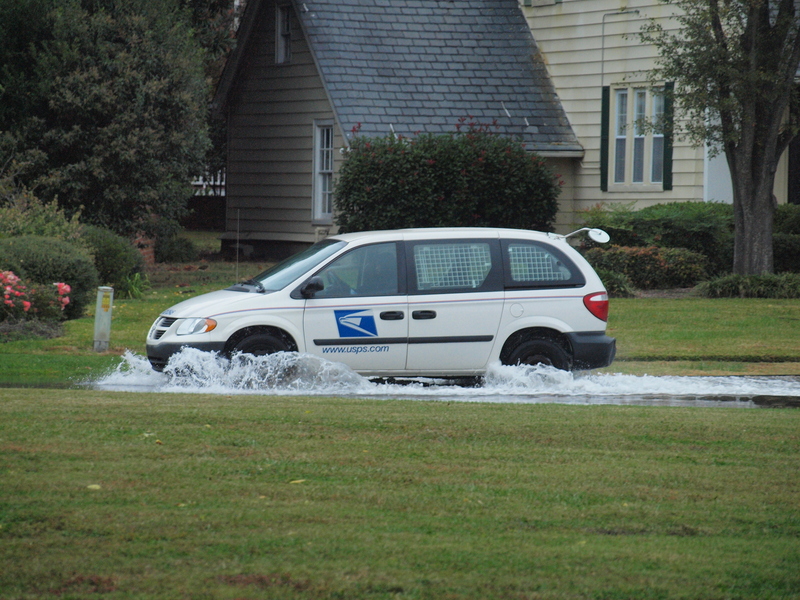
The mail service is impacted by the flodding, and a number of houses are unreachable. |
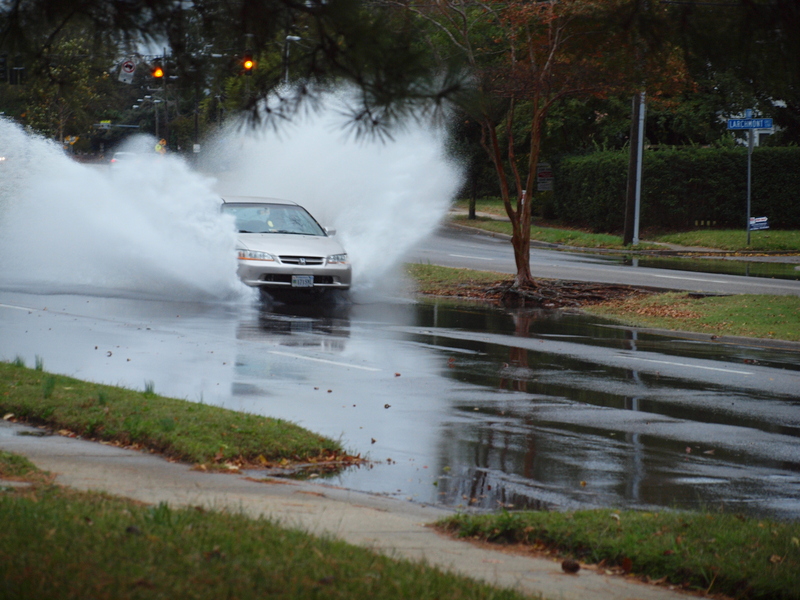
The flooding of Hampton Boulevard impacts traffic and creates many dangerous situations, besides damaging the cars that are driven through the nearly foot-deep water. |
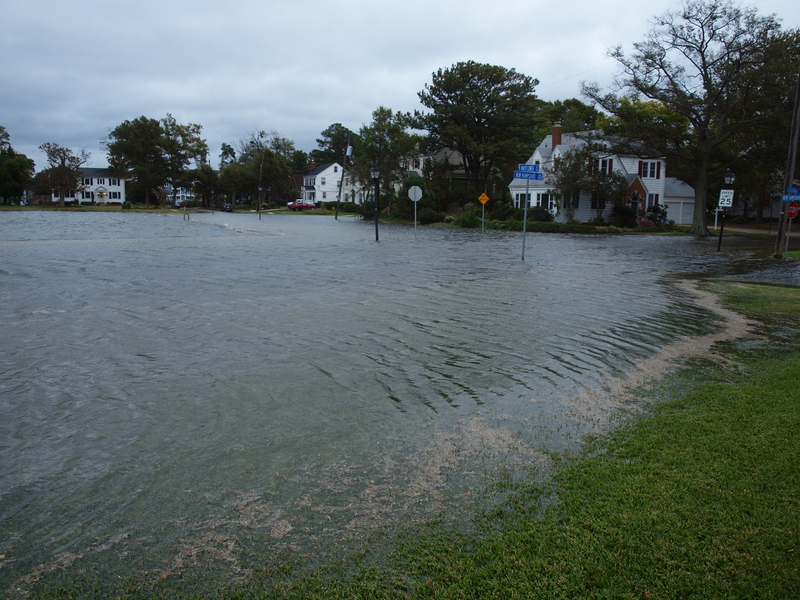
The second house in the street has recently been elevated by about 8 feet. However, the flooding blocks the street and the house is not reachable. |
| |
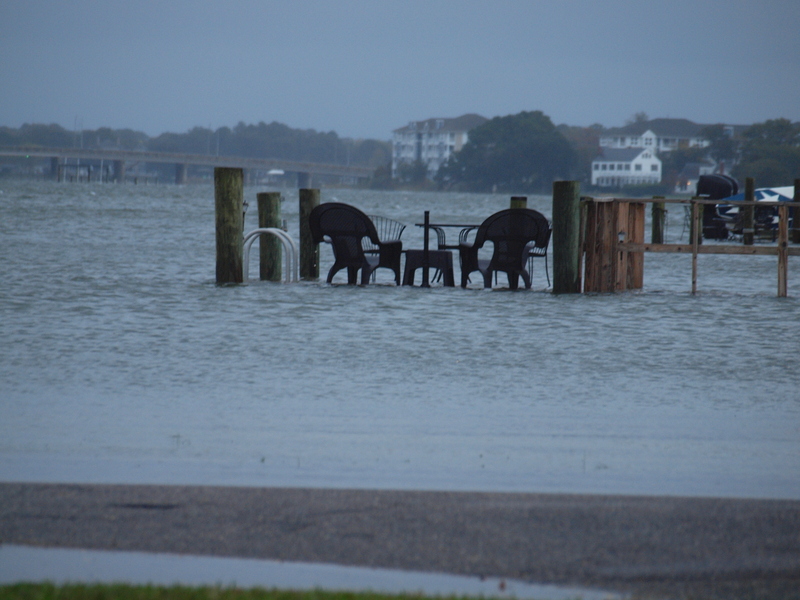
Chairs on a pier that is normally well above the water are now in the water. |

Using the Titan utility made available by the city government, the extent of the flooding in Norfolk can be visualized as function of the water level. The picture is for approaximately 5.0 feet above MLLW. |
|
|
[October 31, 2014] Chuck Hagel says climate change is as bad as ISIS: The Huffington Post reports that the U.S. Secretary of Defence considers the threat of climate change as bad as the threat from ISIS. Read the article by Jennifer Bendery.
|
|
[October 30, 2014] More on the causes of sea level rise: The Guardian summarizes the main findings of a new paper on the contributions to sea level rise. About half of the current rise appears to be due to contributions from the Greenland and Antarctic ice sheets. Read the article by John Abraham.
|
|
[October 15, 2014] Climate Change has come to Norfolk: As reported in The Atlantic City Lab, Climate change has come to Norfolk (which sound like the modified title of a Leonard Cohen song), and ODU has responded with MARI to produce the practice-relevant knowledge that can help to find solutions. Read the article by Henry Grabar.
|
|
[October 13, 2014] Climate Change a "threat multiplier" to be addressed "in a mere twilight: Secretary Chuck Hagel announced today the release of DoD's Climate Change Adaptation Roadmap; see http://www.whitehouse.gov/blog/2014/10/13/climate-change-issue-national-security. In the announcement, he identified climate change as a threat multiplier, and citing military strategist Carl von Clausewitz, he pointed out that "all action must, to a certain extent, be planned in a mere twilight." The announcement mentions Hampton Roads as a region of special interest to DoD. He acknowledge the global nature of the problem and underlined the need to work with other nations.
|
|
[October 1, 2014] Unless we change direction, we will cross climate thresholds into an unpleasant future: Global temperature is likely to rise 3.3-5.6 degrees Celsius by the end of this century, unless international climate negotiations in Paris next year are more effective than expected, according to a report released Monday by the MIT Joint Program on the Science and Policy of Global Change. Read more ...
|
|
[September 28, 2014] Virginia Hurricane Storm Surge Tool released:: The Virginia Department of Emergency Management (VDEM) released a map for Virginia that shows storm surge zones indicating the maximum area that may be inundated by a hurricane of a given value for current sea level. No sea level rise has been taken into account to show how these zones might change in the future. See the map ...
|
|
[September 23, 2014] Special issue on Meteotsunamis:: The journal Natural Hazards has published a special issue on meteotsunamis. The contents are available here. The paper by Lipa et al. addresses the June 2013 U.S. East Coast meteotsunami.
|
|
[September 21, 2014] Here is what you can do: Desmond Tutu calls for tactics that beat apartheid to be used in climate fight: Desmond Tutu has called for an international campaign to boycott mining companies, oil corporations and other businesses involved in the trade of fossil fuels. Prior to this week's UN climate summit in New York, Tutu underlines the deep injustice in the fact that those who contribute least to climate change are suffereing most. Read the article in The Guardian ...
|
|
[September 19, 2014] Population explosion likely to continue in the 21st Century: A new study led by Patrick Gerland, United Nations Population Division in New York, and published in Science concludes that there is a high probability (80%) that the rapid growth of the global population will continue throughout the 21st century. This lowers the chances to mitigate climate change and manage its impacts. Read a summary here. Fred Pierce points out that it is not overpopulation that causes climate change, but rather overconsumption - see the article in The Guardian here ...
|
|
[September 17, 2014] Impacts of disaster are increasing: Reuters reports that in 2013, natural hazards uproot 22 million people globally, twices as many as 40 years ago (read the article ...). The number of people affected by disaster due to natural hazards is expected to continue rise. Rising sea level will contribute to this. For Australia alone, the damage could be as much as $226 billion (read the article in The Guardian ...). Unlike most people think, fixing climate change may actually not add any costs, finds a study discussed in an article in the New York Times ...
|
|
[September 14, 2014] Cities impacted by growing natural hazards largely have to rely on own resources: An article in Governing underlines the fact that in the absence of adaptation program on state or federal levels many of the U.S. cities facing increasing climate-related hazards have to increase resilience to cope with the problems. Interestingly, the few readers' comments are from non-experts doubting the reality of human-caused climate change. |
|
[September 9, 2014] Virginia Secure Commonwealth Sub-panel report discussed in the press: The Bay Journal discussed the report's recommendation concerning emergency management. Read the article ...
|
|
[September 4, 2014] Sea level rise in the press, and Norfolk is mentioned again and again: Two examples of recent reports on the threat of sea level rise are the article in Governing.com and the study by Reuters. In both cases, Norfolk is mentioned as a place already severely impacted. As the Reuters study concludes, mitigating the impacts of sea level rise is causing increasing costs for the American tax payer.
|
|
[September 2, 2014] The link between diets and climate changes: A new study, published today in Nature Climate Change, suggests that — if current trends continue — food production alone will reach, if not exceed, the global targets for total greenhouse gas (GHG) emissions in 2050. The study shows that increased deforestation, fertilizer use and livestock methane emissions are likely to cause GHG from food production to increase by almost 80%. This will put emissions from food production alone roughly equal to the target greenhouse gas emissions in 2050 for the entire global economy. Read more ...
|
|
[August 29, 2014] Is our civilization heading for the irreversibel collapse?: A study under the lead of Safa Motesharrei finds that our industrial civilization might be heading for 'irreversible collapse'. An interdisciplinary team of natural and social scientists developed a new model for societal dynamics and showed that under certain conditions, the global system could collaps. The article was picked up broadly in the press (see for example the news article in The Guardian) and may have been misinterpreted. The authors responded to questions (see here). To get information on the model used, see here. |
|
[August 25, 2014] Divergent Perception and Reality: The latest survey of Hampton Roads' population revealed that there is a large discrepancy between reality and people's perception of the impacts of sea level rise, with the respondents tending to ignore the impacts and assuming falsly that responsibility for the damage caused by flooding is with the property insurances. Read the full article ... |
|
[August 16, 2014] Planning for Climate Change: In an article titled “As Climate Changes, 'Underwater Mortgage' May Take on New Meaning” James Tarmy discusses the key criteria that young people should consider with respect to climate change impacts on their lives over their long live. He finds that most studies simply come down to “a question of temperature, coastal cities, and water availability — those are the big driving forces.” Read the full article ... |
|
[August 15, 2014] Children are on the front line of climate change: A UNICEF Report published in April 2014 states that children and young people, who represent 30% of the world's population, represent the largest most vulnerable group of people currently affected by climate change. They also are the group that has to deliver the deepest cut in carbon emissions needed to reduce climate change. An article in the Guardian points out that they, who own the risk, are seen but not heard and summarizes ways of how children could be involved in the dialog about climate change. |
|
[August 1, 2014] ODU named one of 50 great affordable eco-friendly colleges by Best Choice Schools: ODU is included in the list of the “50 Great Affordable Eco-Friendly Colleges” published by “Best Choice Schools published recently. ODU is number 32 in this list. After the news was posted on ODU's Facebook page, ODU friends reacted very positively to the news (see the screen shot to the right). See the full list ... |
 |
 |
|
[July 29, 2014] A long history of taking away the room for water contributes to frequent flooding: The changes in the map of Norfolk over the last 100 and more years, which illustrate the progressive filling of the space occupied by water to get more valuable real estate, have contributed to increased flooding. An article in the Virginian Pilot discusses the details. Read the article. |
|
[July 28, 2014] Increase in nuisance flooding along the U.S. Coasts documented in a NOAA report: The report “Sea Level Rise and Nuisance Flood Frequency Changes around the United States” published by NOAA finds that nuisance flooding caused by sea level rise has increased on all three U.S. coasts, between 300 and 925 percent since the 1960s. Read the summary or access the report ...
|
|
[July 25, 2014] Credibility of Science: In a column in the journal ApoGeo Hans-Peter Plag, ODU, finds that the credibility of science requries scientists to better clarify what they do not know instead of mapping this all into a wide range of uncertainty. He uses the recent rapid change in our knowledge of the potential contribution of ice sheets to sea level rise as an example to illustrate the problems in communicating scientific knowledge to society. Read the column ...
|
|
[July 24, 2014] Paper co-authored by ODU researchers reported in the press: The paper co-authored by Tal Ezer and Larry Atkinson, ODU, on frequent flooding is referenced in a article in the Virginian Pilot titled “Flooding in Norfolk getting worse, ODU study shows.” Read the article ...
|
|
[July 23, 2014] Report on reducing coastal risks on the East and Gulf Coasts released: The Division on Earth nad Life Studies of the National Academies released a report that examines coastal risk reduction strategies for the East and Gulf Coasts and principles to guide future investments. The report finds the nation has been largely reactive to date, with the majority of coastal-storm-related federal investments provided only after disasters occur. Very little of the funding is used for strategies that reduce the consequences of coastal storms. Given the enormous and rising costs of coastal disasters, the report identifies the need for a strategic national vision for reducing risks, guided by a national coastal risk assessment that identifies areas most at risk. See here for more details and access to the report. The report can be downloaded here.
|
|
[July 21, 2014] Sea Level Rise makes it into the theatre: The Virginia Stage Company commissioned a musical on the impacts of sea level rise on the area. The work, which is created by Eric Schorr, is set to premiere at the Wells Theatre in Norfolk in early 2016. It is the fifth theater piece commissioned by the regional, professional theater company for its “American Soil” series on subjects relevant to the area and beyond. See here for more details.
|
|
[July 19, 2014] U.S. poor in energy efficiency: Germany tops a new energy efficiency ranking of the world’s major economies, followed by Italy, China, France, and Japan, according to the American Council for an Energy-Efficient Economy (ACEEE). The United States ranked 13th out of 16 nations, behind countries such as India, China, and Canada, although new carbon pollution standards proposed this June for existing power plants would be a major stride in the right direction, the ACEEE said. See here for more details. The report can be downloaded here ...
|
|
[July 18, 2014] The planet is getting hotter: The U.S. National Oceanic and Atmospheric Association issues a report each year compiling the latest data collected by scientists from around the world. The annual report for 2013 was published, and it documents a clear message: the planet is still getting hotter, and sea level continues to rise. See here for the highlights of the report. A commentary is available here. The fact that changes are faster than at any point on record is emphasized in a comentary in Science, see here ...
|
|
[July 10, 2014] Climate Deniers Strike Back: A few days after climatologist Dr. Christopher Keating offered a $30,000 reward to anyone who can disprove that man-made climate change is real (see here), climate deniers strikes back: At a climate skeptic conference in Las Vegas, the Committee for a Constructive Tomorrow (CFACT) announced a fundraising effort to produce a documentary that would offer the climate skeptic's perspective on global warming. The attack is spearheaded by Marc Morano, dubbed the "king of skeptics" by Newsweek. See here for more details ...
|
|
[July 9, 2014] Report Offers Policy Solutions to Safeguard Coastal Virginia from Rising Tides: The Chesapeake Climate Action Network (CCAN) released the report “Safe Coast Virginia: Climate Change Threats and Practical Solutions for Virginia.” The group proposes 10 recommendations to reduce carbon pollution and manage sea level rise. Access the report ...
|
|
[July 6, 2014] Invitation to climate deniers to make their case — and win a price, if they can: Physics professor and climate change expert Dr. Christopher Keating is offering a $30,000 reward to anyone who can disprove that man-made climate change is real. Read more here ... |
|
[July 2, 2014] Governor McAuliffe Signs Executive Order Convening Climate Change and Resiliency Update Commission : Governor McAuliffe visited First Landing State Park on the shores of the Chesapeake Bay in Virginia Beach to sign Executive Order 19, convening the Governor’s Climate Change and Resiliency Update Commission. Read more here ... |
|
[June 29, 2014] To address climate change, nothing substitutes for reducing CO2 emissions: A new study by Raymond Pierrehumbert, Louis Block Professor in Geophysical Sciences at the University of Chicago, and holder of the King Carl XVI Gustaf Chair in Environmental Sciences at Stockholm University for 2014-2015, indicates that reducing CO2 emissions is essentially the only way to address climate change. Because of a long-lasting effect of CO2 impacting climate several thousand years after emissions stopped, efforts to reduce emissions of other much shorter-lived greenhouse gases instead of CO2 are a “delusion:” “Until we do something about CO2, nothing we do about methane or these other things is going to matter much for climate,” Pierrehumbert said. Read more here ... |
|
[June 28, 2014] Ice sheets may have already passed point of no return: Another scientific publication is added to the sequence of recent papers increasing the worry about a rapid sea level rise due to the melting of the large ice sheets. This time, the paper reports that during times only slightly warmer than currently most of the Greenland ice sheet melted, increasing global sea level by several meters. Read more here ... |
|
[June 27, 2014] Mitigation and Adaptation Assessment Report for Virginia: The Mitigation and Adaptation Research Institute (MARI) of Old Dominion University invites the academic community in Virginia to participate in a state-wide assessment of the knowledge on mitigation and adaptation with a focus on the practice-relevant knowledge societal stakeholders in Virginia need to ensure the livelihood of the communities under the expected changes in climate and sea level. Read more here or download the invitation ... |
|
[June 26, 2014] U.S. faces significant economic risks from climate change: The Risky Business Project launched in October 2013 has released a report on the “The Economic Risks of Climate Change in the United States.” The report concludes that the U.S. faces significant and diverse economic risks from climate change. The PDF version can be downloaded from the above page and a local copy is available here. Details to support the report are in a Climate Prospectus (download; local copy). Many articles have commented on the report, see for example, WSJ, The Hill, Frobes. |
|
[June 25, 2014] Adating to a transient coast: In an event organized by the Urban Land Institute (ULI) at ODU, about 50 ULI members and guest were informed about the challenge of leaving the Holocene, the consequences this has for sea level and Hampton Roads, and the paradigm shifts needed to adapt to a more dynamic and potentially moving coastal zone. After a presentation by Hans-Peter Plag, a panel with Wie Yusuf (ODU), Joshua Behr (ODU), and Skip Stiles (Wetlands Watch) engaged in a dialog with the audience. Visit the event page ... |
|
[June 24, 2014] As Sea Levels Rise, Norfolk Is Sinking And Planning: A NPR feature discusses the impacts of sea level rise on businesses and the navy in Norfolk. Ray Toll, MARI, contributed to the feature. Visit the feature web page to listen to the show ... |
[June 21, 2014] Leaving the Holocene: A presentation at the TEDx conference on June 20, 2014 illustrated the potential consequences for sea-level rise that result from the fact that the planet is moving into the post-Holocene and discussed the paradigm shifts required to prepare for this new geological epoch. To watch the presentation go to http://tedxhamptonroads.com/; the presentation is in Session 2 and starts at about 43 minutes into the session.
Added on June 26, 2014: See the report in ODU Insight ... |
|
[June 13, 2014] TEDx conference will be held in Norfolk: A TEDx conference on June 20, 2014 will feature 16 speakers talking about "Relevant Progress" in Hampton Roads. See the event page at http://tedxhamptonroads.com/ and read an article in DailyPress. |
|
[June 11, 2014] Sea-Level Rise: A challenge and opportunity for Norfolk?: Two commentaries look at sea level rise from different points of view: Summarizing an article published in the Washington Post, Ted Cushman focuses on the challenge that sea level rise poses to Norfolk (read more), while Eudaimonia Amoruso has a more positive vision of a Norfolk growing more sustainable and beautiful through adaptation (read more). |
|
[June 8, 2014] Guest Column underlines the need to include the people in the discussion about how to adopt to sea level rise: In a guest column in the Virginian Pilot, Chris Bonney made a strong plea to include the voice of the people in Hampton Roads in the discussion of how the region can adopt to sea level rise and mitigate the impacts on people and life in the region. Read the column ... |
|
[June 5, 2014] Discussion reveals limits for insurance protection against natural disasters: A panel discussion organized by Resource for the Future on limits for securitization and the future of insurances concluded that the “twin forces of climate change, altering weather patterns around the globe, and globalization, in terms of increased migration, interconnected supply chains, and rapidly changing technologies, have raised the question as to whether disaster events are becoming increasingly uninsurable.” Read more in the documentation ... |
|
[June 4, 2014] 2014 TechSurge took place at ODU: More than 230 civic leadership, municipal employees, planners, Navy, NOAA, industry partners and students from across the region attended the 2014 TechSurge, Technical Support for Coastal Resiliency held on June 3-4, 2014 at ODU in Norfolk, VA. The event was opened with the announcement by the President of ODU, John Broderick, that ODU established the Mitigation and Adaptation Research Institute (MARI) and followed by a high-level panel discussing a Hampton Roads pilot project aiming to explore options for a “Whole Government” approach to adaptation to sea level rise and other climate change impacts in the region. The technical presentations gave insight into the observational efforts, data available and services aiming at environmental intelligence. The conference was closed by a speech given by the Administrator McCarthy of E.P.A., who commented on federal efforts in climate mitigation. Read more about the event on the event page ... |
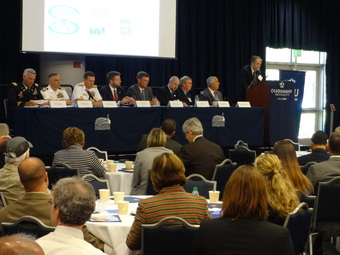
The panel discussing the Hampton Roads Pilot Project include representatives of the Navy, the US Army Corps of Engineers, State and local governments, and businesses.
| 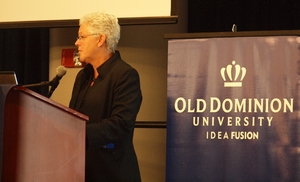
The conference was concluded with a speech by E.P.A. Administrator McCarthy, who ensured the audience that the U.S. President and the federal agencies are determined to do as much as possible to limit the changes in the climate.
|
|
[June 3, 2014] 2014 TechSurge started at ODU: More than 200 stakeholders in coastal resilience are participating in the 2014 TechSurge on Technical Support for Coastal Resiliency, which is being held on June 3-4, 2014 at ODU in Norfolk, VA. The Virginian Pilot reported on the conference and the announcement of a Hampton Roads PIlot Project in an article. Read more about the event on the event page ... |
|
[June 2, 2014] Norfolk's flooding problems made news in D.C.: An article published in the Washington Post on May 31, 2014 reports in detail on the problems sea level rise is causing in Norfolk and adjacent cities, and it quotes Larry Atkinson, Co-Director of CCLSRI, and Michelle Covi, MARI, who comment on the implications of sea level rise for the region. |
|
[May 31, 2014] The U.S. takes steps in climate change mitigation: The U.S. President announced new rules of the Environment Protection Agency for power plants aiming at a significant reduction of the carbon dioxide emitted by these plants and linked climate change mitigation to health; see for example the report in The Guardian. It is expected that the new rules will create considerable opposition; see the commentary by Paul Krugman ... |
|
[May 29, 2014] Melting of Antarctic ice has previously contribute to rapid sea level rise: A new study by Weber et al. published in Nature this week links events of rapid sea level rise that happened during the last deglaciation to instabilities of the Antarctic ice sheet. The largest of these meltwater pulse resulted in global sea level rise of more than 15 m in just 350 years. This new finding underlines the potential threat associated with the recently discovered irreversible melting of West Antarctic ice sheet. Read the press announcement ... |
|
[May 22, 2014] ODU Hosting Conference for National Pilot Project on Sea Level Rise: A first-of-its-kind conference on the resiliency of coastal areas to the threats of climate change will bring an expected 250 planners from all levels of government and industry to Old Dominion University on June 3-4, 2014. Read more ... Visit the Event Page ... |
|
[May 20, 2014] The answer to a question from a student: In a column in ApoGeo, an answer is given to the question what the older ones should tell their 20-year old self: “the most likely single cause of premature death for my younger self is one or another impact of climate change” writes Dr. Hans-Peter Plag in his latest entry in the column “On the Edge”. Read the column here ... |
|
[May 19, 2014] One threat seldom comes alone: Last week two publications emphasized the threat of the irreversible melting of the West Antarctic Ise Sheet (see the news item of May 13, 2014). This week, another article revised the knowledge about the Greenland Ice Sheet (GIS) and shows that because of the existence of newly discovered deep valleys under the GIS, the GIS very likley will contribute much more to sea level rise than previously thought. Read the UCI press release here. Also, see this commentary ... |
|
[May 17, 2014] Climate Change Impacts Air Quality in Summer: A press release of the National Center for Atmospheric Research/University Corporation for Atmospheric Research available through Science Daily reports on a new study showing that Summertime ozone air pollution levels in the United States could rise 70 percent by 2050 due to climate change. The study was published by Pfister et al. (2014). For some background information on tropospheric ozone, see here ... |
|
[May 16, 2014] The melting of WAIS and its impact on D.C.: Neil Augstein took the news about the irreversible melting of the West Antarctic Ice Sheat (WAIS) seriously and asked “Can D.C. survive 'unstoppable' ice melt?” Read here what he found ... |
|
[May 15, 2014] Restricting the planning horizon to 30 year: As reported in a article in The State, the North Carolina Coastal Resources Commission decided to consider sea level rise only for the next 30 years in their new assessment. It is an interesting approach to planning coastal infrastructure with lifetimes much longer than 30 years based on sea level rise for the next 30 years, which may easily commit very high costs for future generations. Read the reasons the Commission chair man gives for this short-sighted approach here ... |
|
[May 13, 2014] Irreversable melting of West Antarctic ice sheet confirmed: A New York Times article by Justin Gillis and Kenneth Chang titled “Scientists Warn of Rising Oceans From Polar Melt” comments on two recent scientific publications that provide evidence of the irreversible melting of the West Antarctic ice sheet (WAIS). The total melting of the WAIS would contribute more than 4.5 m to global sea level rise. It is, however, not clear how fast the melting can take place. The fact that the irreversible process has started is worrysome for an increasingly coastal urban population. Read the article ... The news also made it into TIME ... |
|
[May 11, 2014] “National Climate Change Viewer” Enables Focus on Future Climate-Driven Changes: Secretary of the Interior Sally Jewell unveiled on May 9th, 2014 the National Climate Change Viewer, a climate-visualization website tool from the Interior Department’s U.S. Geological Survey. This new tool enables citizens and resource managers to look at climate-driven impacts on watersheds and map projected changes at the local, regional, state and watershed levels. The announcement follows right after the release of the Third National Climate Assessment, which gives a comprehensive scientific assessment of climate change and its impacts across America and major sectors of the U.S. economy. |
|
[May 7, 2014] Military Leaders Applaud National Climate Assessment and Secretary Hagel's Statement on Climate and National Security: In a press release of the Center for Climate and Security, which is a nonprofit policy institute with a distinguished Advisory Board of senior retired military leaders and security professionals envisioning a climate-resilient world, several of the Advisory Board members make statements in support of the National Climate Assessment published on May 6, 2014. Read their statements here ... |
|
[May 6, 2014] National Climate Assessment Released: The White House released yesterday the 2014 National Climate Change Assessment, which summarizes the impacts of climate change on the United States, now and in the future. A team of more than 300 experts guided by a 60-member Federal Advisory Committee produced the report, which was extensively reviewed by the public and experts. The report includes analyses of impacts on seven sectors — human health, water, energy, transportation, agriculture, forests, and ecosystems — and the interactions among sectors at the national level. It identifies many impacts of climate change on society happening already today and anticipates that these trends will increase in the future, posing a threat to the national and global communities. Explore the report here ... |
|
[April 28, 2014] “Sea of Change” screening at ODU: Over 100 people attended the screening of Sea of Change, a short documentary film produced by the Chesapeake Climate Action Network (CCAN), at ODU on April 27, 2015. Introducing the film was Quan, Williams, a policy advocate for the Virginia New Majority, who described their organization's involvement in the project as an environmental justice and equality issue for those who are not able to respond to flooding disasters. Following the screening a panel discussion with several of the participants in the film allowed the audience to dig deeper into the how sea level rise will affect specific industries in the region and what citizens can do to make a difference. Watch the movie here ... |
|
[April 26, 2014] Talking to the Younger Self: A column titled A talk with a younger self by Hans-Peter Plag published in the Virginia Pilot on April 20, 2014 triggered considerable discussion. The latest contribution is a letter to the editor titled Younger Self, which stimulated more than 40 comments. |
|
[April 21, 2014] The oceans are the dominant term in the planetary energy budget at annual time scales: Matthew England and colleagues report in an article in Nature Climate Change that a recent intensification of wind-driven circulation in the Pacific can explain the ongoing warming hiatus identified in Globally averaged Surface Temperature (GST). An article by M D Palmer and D J McNeall in Environmental Research Letters (Environ. Res. Lett. 9 034016, doi:10.1088/1748-9326/9/3/034016) concludes that Ocean Heat Content (OHC) and net Top-of-Atmosphere radiation (TOA) are better indicators of global warming than GST, and they find that both OHC and TOA have continued to increase in the last decade. In a commentary in the Guardian, Kate Ravilious finds that “Like it or not Earth's future is looking hot.” |
|
[April 21, 2014] “Years of Living Dangerously” tells the “Greatest Story Ever Ignored”: The Showtime documentary series Years of Living Dangerously tells the one story we all should be concerned about. Read about what it is, who is in it, and what it is all about here ... |
|
[April 14, 2014] The time to mitigate climate change is running out: The latest report of the Intergovernental Panel on Climate Change (IPCC) published on April 13, 2014 states that the time for mitigating climate change and avoiding the extremely high costs of doing nothing is running out. The New York Times reports in an article published today, that “only an intensive push over the next 15 years to bring those emissions under control can achieve the goal.” Ottmar Edenhoffer, the Co-Chairman of the IPCC is siad to have stated that “If we lose another decade, it becomes extremely costly to achieve climate stabilization.” See the report ... |
|
[April 11, 2014] Ten Finalists of the “Rebuild by Design” competition unveiled their proposals: On April 3, 2014, an article in the NyMag reported that the ten finalists of the design competion that aims to turn the rebuilding after hurricane Sandy from a rebuilt as is was to a rebuilt and improve unveiled their proposals. The competion helps to elevate resilience to a national priority, the article claims. |
|
[April 10, 2014] “We have moved into the driver seat”: Speaking to a group of leaders from New Orleans, who had come to Hampton Roads to inform themselves how mitigation and adaptation to sea level rise is addressed in the region, Dr Hans-Peter Plag pointed out that climate change and sea level rise are a symptone of the current unsustainability. Moving out of the Holocene and into the Anthropocene, humanity “has moved into the driver seat of the bus” and taken responsibility for how the planet is developing. Down-load the presentation as key or ppt ... |
|
[April 9, 2014] Planning for the possibility of abrupt climate change impacts: The Co-Director of ODU's Climate Change and Sea Level Rise Initative, Dr. Plag, underlined the need to consider the possiblility of abrupt climate change impacts, including rapid sea level rise, in the planning of coastal communities and infrastructure in a presentation given at the 2014 Econference held on April 8, 2014 in Virginia Beach. Down-load the presentation as ppt or key file. Added on April 11, 2014: Read the summary article in Inside Business ... |
|
[March 31, 2014] IPCC identifies severe climate impacts globally and expects worse for the future: The most recent IPCC Assessment Reports states that climate change is happening with severe impacts on global level causing a wide range of challenges and problems. For the future, IPCC expects worse. A NYT article reporting on the release of the IPCC report quotes Rajendra K. Pachauri, chairman of the IPCC, who said at a news conference today “Nobody on this planet is going to be untouched by the impacts of climate change.&rdquo. Read the NYT article ... |
|
[March 30, 2014] Sea level rise is increasingly challenging the poorest in the world: The NYT documents the perils of some of the poorest regions in the world inflicted by the many impacts of rising sea levels. The people in these regions are loosing the basis for their life and there is no relief in sight. Read the NYT article or look at the pictures documenting the increasing impacts. |
|
[March 29, 2014] 5th Adaptation Forum brought together stakeholders in floodplane management: The Fifth meeting of the Hampton Roads Sea Level Rise/Flooding Adaptation Forum brought together some 70 stakeholders to discuss how to address current and future vulnerability through floodplain management. The forum took place at ODU campus on March 28, 2014. For more information, see here ... |
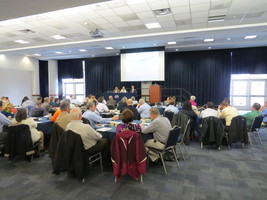 |
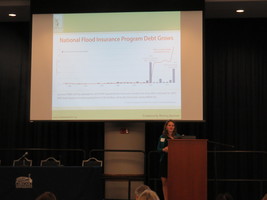 |
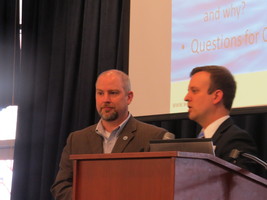 |
|
[March 17, 2014] Greenland ice sheet appears to be melting faster than expected: Measurements of vertical land motion in Greenland reveal that the ice sheet is melting faster than previously expected. This is reported in a Nature Climate Change paper published on-line on March 16, 2014. The paper by Khan et al. reports that a part of the ice sheet considered to be stable is actually melting and contributing to sea level rise. To read the paper, go to 10.1038/NCLIMATE2161. For comments, see, e.g., http://m.phys.org/_news314191890.html. |
|
[March 10, 2014] Major investors are understanding and reacting to the threads (and opportunities) of climate change: The Corporate Social Responsibility Netwire (CSRwire reports in a press release that major institutional investors are pushing for stronger actions from companies in climate-related shareholder resolutions in the 2014 proxy season.
|
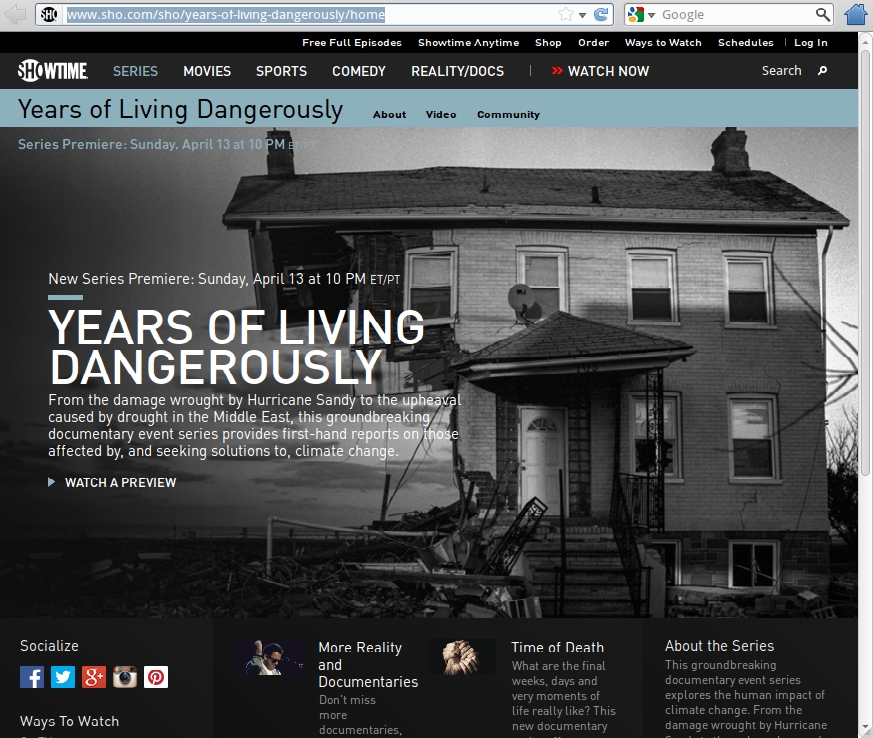
|
[March 5, 2014] New SHOWTIME Series Premiere “YEARS OF LIVING DANGEROUSLY” starts on Sunday, April 13 at 10 PM ET/PT: This groundbreaking documentary event series explores the human impact of climate change. From the damage wrought by Hurricane Sandy to the upheaval caused by drought in the Middle East, YEARS OF LIVING DANGEROUSLY combines the blockbuster storytelling styles of top Hollywood movie makers with the reporting expertise of 60 MINUTES journalists. Go to Showtime and watch the preview ...
|
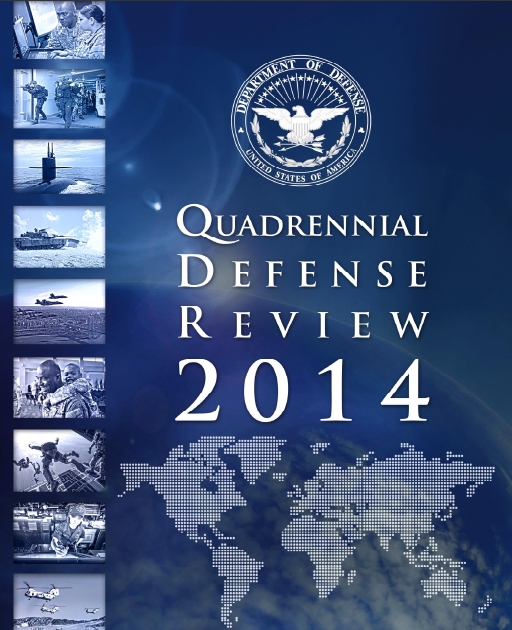 |
[March 04, 2014] 2014 Quadrennial Defense Review highlights climate change as a national threat: The 2014 Quadrennial Defense Review report published recently by the U.S. Department of Defence highlights climate change and its impacts to national security throughout the report. The report is available as pdf ...
|
 |
[February 28, 2014] TechSurge to take place at ODU in June 2014: The TechSurge “Technical Support for Coastal Resileincey” will take place on June 3-4, 2014 at the ODU Ted Constant Center. For more details see the Leaflet or visit the web page. Registration will open on April 1, 2014. The event is organized by the Hampton Roads Section of the Marine Technology Society.
|
|
[February 26, 2014] MARI Stakeholder Survey open: A survey has been opened for stakeholders of the new Mitigation and Adaptation Research Institute (MARI) that is being established at Old Dominion University. The survey will provide information on stakeholders' thoughts about MARI and its potential value for them and their organizations. The results of the survey will be used to review the proposed mission, governance and organization of MARI, and to further develop the research, education, and outreach plans. Of particular interest are comments from external stakeholders on how well MARI will serve their needs and what could be done to improve the linkage between MARI and its stakeholder. For more information and a link to the survey see here ...
|
|
[February 23, 2014] ODU Faculty informed highschool teachers about climate change and sea level rise: In the ODUMUNC Faculty Forum held on February 22, 2014 at the Sheraton Waterside Hotel in Norfolk, a number of ODU faculty and guest speakers gave presentations on varies aspects of climate change and sea level rise. The Forum titled “The Touchy World of Climate Change and Sea levle Rise: Natural Science, Social Science, Philosophy and Pschology” brought together about 70 highschool teachers from the region. For more information on the event, see here ...
| 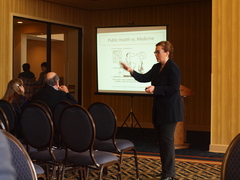
Muge Akpinar-Elci talked about the impacts of climate change on public health. | 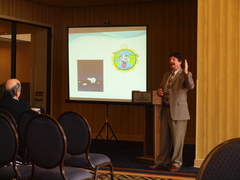
Glen Sussman provided thoughts on climate change in Amercian domestic politics.
|
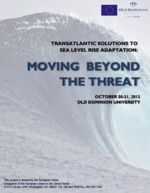
|
[February 21, 2014] ACCESS-EU Conference Report available: The report of the ACCESS-EU conference held on October 29-30 at ODU is now available. The report give a comprehensive overview of the conference and summarize the major outcomes of the meeting that brought together experts and stakeholders in sea level rise from both sides of the Atlantic. Read the report ...
|
|
[February 15, 2014] The first lecture SLR Seminar Series in the Seminar Series attracted a large audience: The first lecture in the Seminar Series on “Mitigation and Adaptation Strategies of Civil/Coastal Engineers for Future Sea Level Rise” organized by the Civil and Environmental Engineering Department at ODU attracted a large audience. Dr. David Basco intorduced the sea level rise challenges faced by Hampton Roads and other areas and discussed the options for coastal engineering to mitigate the impacts. He concluded that the uncertain future introduces the need to “plan for failure.” For more information on the Seminar, see here ...
|
|
[February 12, 2014] OEAS wins NSF award for a Research Experience for Undergraduate (REU) program: The project titled “REU Site: An Interdisciplinary Program for Climate Change Science in Metropolitan Coastal Communities at Old Dominion University,” will establish an NSF REU site with a focus on climate change science in large coastal communities within the Department of Ocean, Earth and Atmospheric Science (OEAS) at Old Dominion University (ODU). Read more about the REU project here ...
|
|
[February 9, 2014] Skip Stiles speaks on sea level rise: Skip Stiles, Wetlands Watch will speak at ODU about “Sea Level Rise, Coastal Risk, and Adaptation Options” on February 27, 2014; 12:20-1:20 in Conference rooms 1 and 2, Perry Library. Looking at what we know about sea level rise, Virginia is the highest risk state on the Atlantic Coast. There are a range of reasons for this and we are seeing impacts already — examples of which will be presented. Also, some of the options for action will be explored. A special look will be taken at the Philippines and its situation with sea level rise.
|
|
[February 6, 2014] David Legler speaks on ocean observing for climate: David Legler, Chief of NOAA's Climate Observations Division in NOAA's Climate Program Office will speak on February 10, 2014 about “The Global Ocean Observing System for Climate: How we observe the global oceans and what they are telling us.” The lecture is part of CCPO's seminar and will take place at 3:30-4:30 PM in Room 1202, Engineering and Computational Sciences Building, at ODU. See http://www.ccpo.odu.edu/Seminars/Sp2014/legler_10feb14.html for details.
|
|
[February 5, 2014] ODU Seminar on Coastal Engineering and Sea Level Rise: The Civil and Environmental Engineering Department at ODU is orgainzing a Seminar Series on “Mitigation and Adaptation Strategies of Civil and Coastal Engineers for Future Sea Level Rise.” The seminar is sponsored by the Civil and Environmental Engineering Department, the Civil and Environmental Engineering Visiting Council, ODU's Batten College of Engineering and Technology, and ODU's Climate Change and Sea Level Rise Initiative. For more information see here ...
|
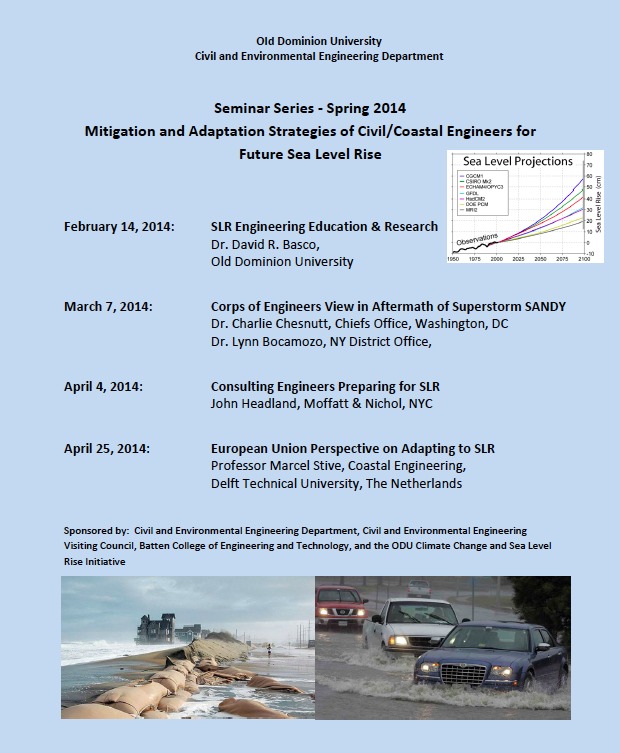
|
|
[January 26, 2014] Costs of climate change high on the agenda of the Davos meeting: The German news media DW reports that at the 2014 World Economic Forum in Davos, the costs of climate change are high on the agenda. The report mentiones that the WEF's Global Risk Report identifies extreme weather events as the second biggest threat to societies. Read the article; see the a video on the Global Risk Report emphasizing the threat of growing inequality; or read the Global Risk Report (local copy). Although many connections are made between climate change and social stability, the full extent still remains elusive and will emerge as surprises. For example, Lisa Deutsch et al. (Global Environmental Change, May 2007, pp. 238-249) and Evan D.G. Fraser and A. Rimas (Foreign Affairs, 30 January 2011) link the wildfires in Russia in 2010 caused by record summer temperatures and droughts and the loss of Russia's wheat harvest to the increase in food prices that are seen as the trigger for the Arab Spring. More such climate impacts on societal developments through global teleconnection will threaten stability and peace in the world.
|
|
[January 25, 2014] Industry is feeling the impacts of climate change: The New York Times reported yesterday that some of the major companies are feeling the impacts of climate change, which starts to interrupt crucial supply chains. As a result, these industries are less willing to accept the claim of the fossil fuel industries that a transition to renewables would lead to negative economic trends. Read the article ...
|
|
[January 23, 2014] External stakeholders invited to comment on the proposed Mitigation and Adaptation Research Institute: The proposed Mitigation and Adaptation Research Institute (MARI) was presented to a small number of invited stakeholders representing local city governments, NGOs and businesses. The reaction of the participants was in general positive. The participants emphasized the need to understand the role of the human component in decision making and the importance of framing the scientific knowledge in a way that societal stakeholders can connect to it. The participants also saw the need to connect MARI well to the societal stakeholders. Due to the weather conditions, several confirmed participants including the emergency managers of several cities in Hampton Roads had to cancel. A wide survey of stakeholder input concerning MARI is planned for February 2014. For more information see the MARI proposal web page or contact Hans-Peter Plag at hpplag at odu.edu.
| 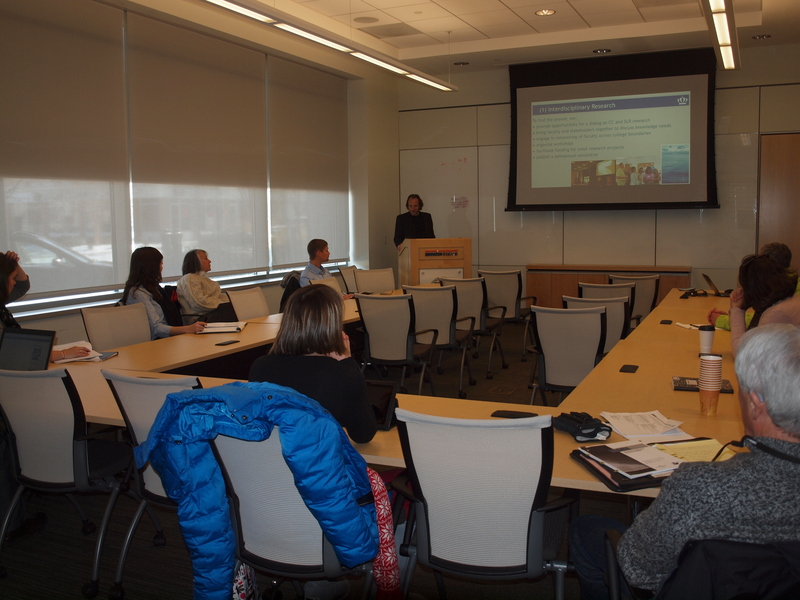
|
|
[January 22, 2014] ODU Faculty supports proposed Mitigation and Adaptation Research Institute: During a meeting on January 21, 2014, about thirty ODU faculty members were informed about the plans to establish a Mitigation and Adaptation Research Institute (MARI) at ODU. The reactions were in general positive and there was support for the anticipated transdisciplinary nature of MARI and its focus on societal knowledge needs. For more information see the MARI proposal web page or contact Hans-Peter Plag at hpplag at odu.edu.
| 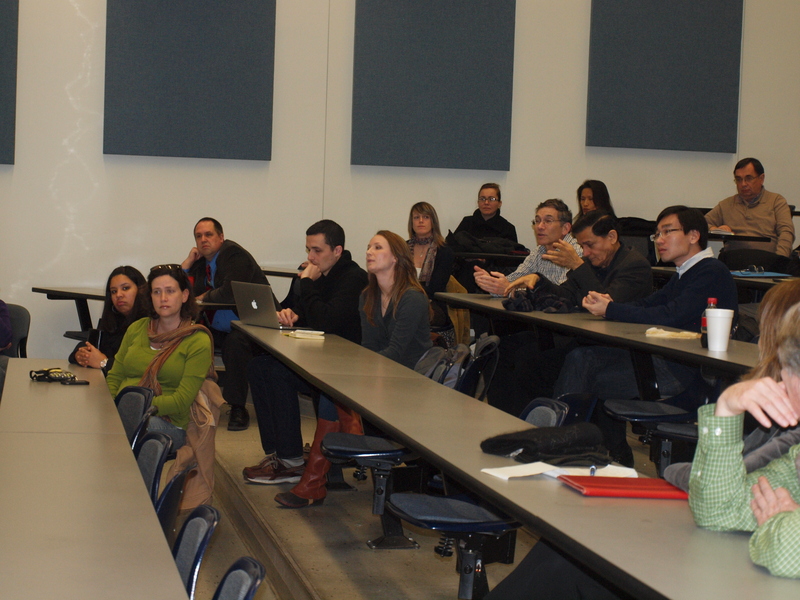
|
|
[January 10, 2014] ODU Faculty meeting to discuss MARI: The ODU provost invited the ODU faculty to a meeting on January 21, 2014 concerning the proposed new Mitigation and Adaptation Research Institute (MARI), which is under establishment at ODU. For more information, see the invitation ...
|
|
[December 18, 2013] USA Today Reports on Norfolk being tormented by rising sea levels: An article published in USA Today on Tuesday, December 17, 2013, reports on the many problems the accelerating sea level rise is causing for the people in Norfolk, and indicates that there is a high probability that these problems will rapidly get worse and make life and business hard in the area. Read the article ...
|

|
[December 15, 2013] Abrupt Impacts of Climate Change: Anticipating Surprises: The National Research Council has released a report on abrupt climate change impacts, which underlines the possibility of abrupt impacts that could challenge global societies to their core. They found that abrupt change is already underway in some systems, and large scientific uncertainties about the likelihood of other abrupt changes highlight the need for further research. The report calls for action to develop an abrupt change early warning system to help anticipate future abrupt changes and reduce their impacts. See the NRC web page for more information.
|
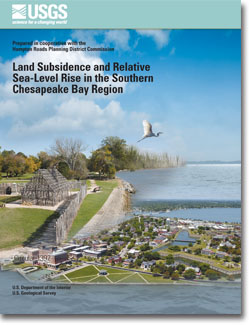
|
[December 12, 2013] Report on vertical land motion in Hampton Roads published: The report “Land Subsidence and Relative Sea-Level Rise in the Southern Chesapeake Bay Region” has been puplished by USGS. The report summarize the current state of knowledge on vertical land motion in the area and its potential causes.
|
|
[December 9, 2013] Faculty of Practice in Climate Change Resilience and Adaptation appointed: Michelle Covi has been appointed as the Faculty of Practice in Climate Change Resilience and Adaptation. This position will provide extensive outreach capacity to the Climate Change and Sea Level Rise Initiative (CCSLRI) at ODU. The position is jointly funded by the Virginia Sea Grant (VASG) and ODU, and it will also facilitate increased crosslinking between the partners engaged in the VASG community.
|
|
[December 6, 2013] Sea Level Rise may be larger than IPCC predicts: Experts start to disagree with IPCC on 21th century sea level rise and consider a higher global sea level rise than predicted by IPCC more likely. See the blog for more thoughts on this and the original study for the details.
|
|
[December 4, 2013] Norfolk one of the first 33 members of the 100 Resilient Cities Network: The Rockefeller Foundation announced the first 33 members of its Resilient Cities Netowrk. Eventually, this network will have 100 members. Read the announcement or a local pdf ...
|
|
[November 21, 2013] Developing countries walk out from climate negotiations: The Guardin reports in an article on November 20, 2013 that 139 countries including China and the G77 walked out from negotiations at COP 19 in Warzaw, Poland, because the leading developed countries, including Australia, the USA, Europe and Norway did not want to discuss seriously compensation for extreme disasters in the developing world attributed to climate change mainly caused by the developed world.
|
|
[November 19, 2013] Proposal for the Mitigation and Adaptation Research Institute (MARI) presented to CCSLRI faculty: A proposal for a new institute at ODU, the Mitigation and Adaptation Research Institute (MARI) was presented to the ODU faculty active in the CCSLRI. The response was in general posititve and a Writing Team was established to finalize the proposal over the next weeks. The work will be documented at a MARI Web Site.
|
|
[November 16, 2013] CCAN Workshop on “Safe Coast Virginia” underlined the challenge of sea level rise for Hampton Roads: A workshop discussing the challenge of climate change and sea level rise for Virginia's coasts and options for adaptation (see the announcement) organized by the Chesapeake Climate Action Network (CCAN) brought together key stakeholders in the region, who emphasized the scale of the challenge Hampton Roads and Virginia's coasts are facing and made a claim for urgent action. The CCSLRI director contributed a presentation (pdf).
|
|
[November 3, 2013] The Virginian Pilot on how to save on flood insurance premiums: In today's article by Sarah Kleiner Varble on “Flood insurance rates up: Tips to keep you afloat” the Virginian Pilot not only reports on the increase in flood insurance premiums but also gives tips how to reduce the premiums through meaningful adapatation. The only sure way to reduce flood insurance premiums by 100% is of course moving out of the flood zone. A related FEMA leaflet is available here.
|
|
[November 2, 2013] IPCC warns about climate change impacts on food security: In a draft IPCC report leaked to the press, the panel points out that “Climate change will pose sharp risks to the world's food supply in coming decades, potentially undermining crop production and driving up prices at a time when the demand for food is expected to soar. ... The warning on the food supply is the sharpest in tone the panel has issued.” Read the New York Times article ...
|
|
[November 1, 2013] White House focuses on preparing the United States for the Impacts of Climate Change: The White House published today an Executive Order titled “Preparing the United States for the Impacts of Climate Change.” The EO acknowledges a long list of climate change impacts, and it mandates significant changes to address these impacts and associated risks. Read the Executive Order. Also available a Fact Sheet and a
OSTP Blog ... |
|
[November 1, 2013] ACCESS-EU Conference at ODU highlights differences in sea level rise adaptation on both sides of the North Atlantic: The ACCESS-EU conference held on October 30-31, 2013 on the ODU campus brought together more than 100 experts from academics, city and state governments, navy, businesses and non-governmental organizations to discuss transatlantic challenges of climate change and sea level rise. The presentations underlined the particular threat of climate change and sea level rise for the urban coasts. The comparison of the best practices in Europe and the U.S. to address this challenge revealed significant differences between the practices on the two sides of North Atlantic, with Europe focusing more on protection and prevention of flooding, while along the U.S. East Coast, focus is more on evacuation before extreme events. For complete documentation of the conference, see the event pages.
|
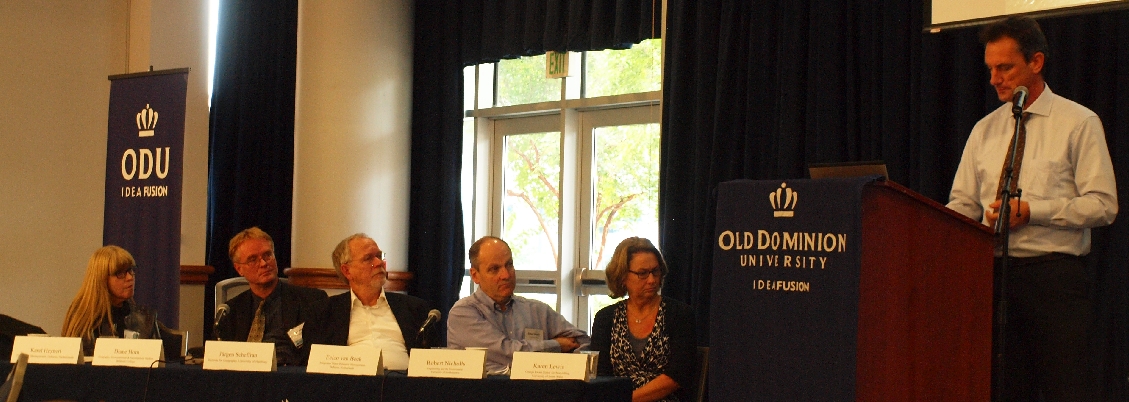
On the second day, the European guests had the opportunity to speak about their own work and/or add their comments to the deliberations of the conference. The Panel members are Karel Heynert, Flood Risk Management, Deltares (speaking) and (left to right) Diane Horn, Department of Geography, Environment & Development Studies, Birkbeck College; Jürgen Scheffran, Institute for Geography, University of Hamburg; Eelco van Beek, Integrated Water Resource Management, Deltares; Robert Nicholls, Engineering and the Environment, University of Southampton; Karen Lewis, George Ewart Center for Storytelling, University of South Wales.
|
|
[October 31, 2013] David Titley at ODU: David W. Titley, Rear Admiral retired, gave a lecture on “The Evolving Understanding of Climate Risk: The Challenge that won't go away ...” The lecture on October 30, 2013 was part of the University President's Lecture Series and integrated in the program of the ACCESS-EU Conference held at ODU. David Titley, who is a Senior Scientist at the Department of Meteorology, Pennsylvania State University, and Director of the Center for Solutions to Weather and Climate Risk at Penn State, underline the extent of the challenge posed to humanity by climate change and the anticipate sea level rise. He gave an account of how our understanding of the threat developed over the last few decades. The audience of more than 400 people saw convincing evidence showing that particularly the urban coasts are at high risk from climate change and sea level rise.
|
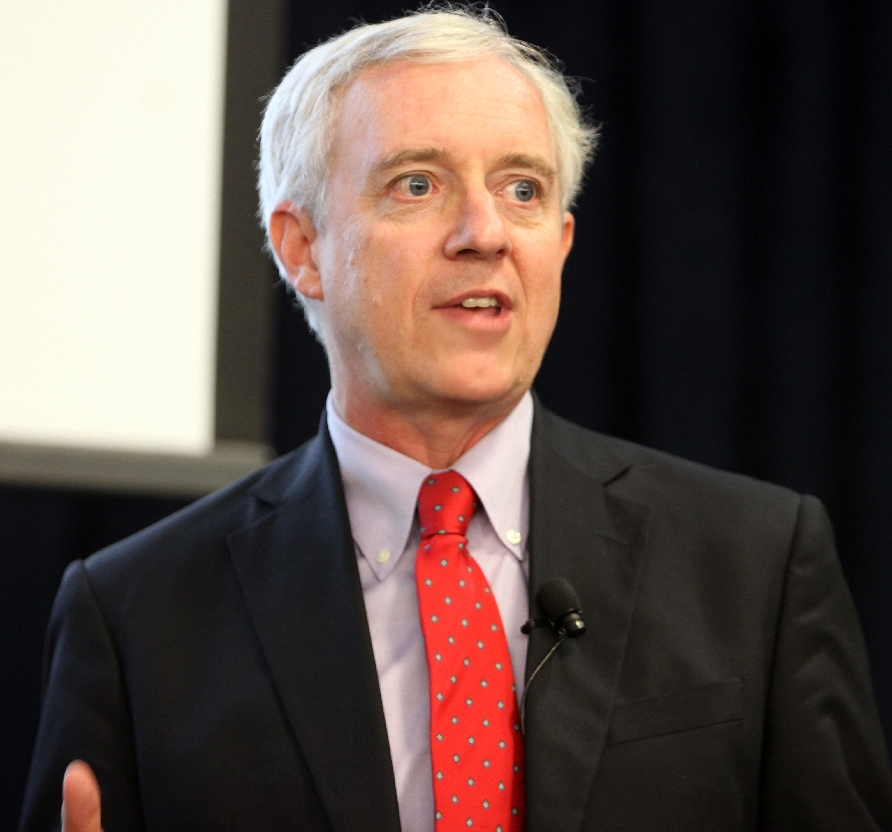
|
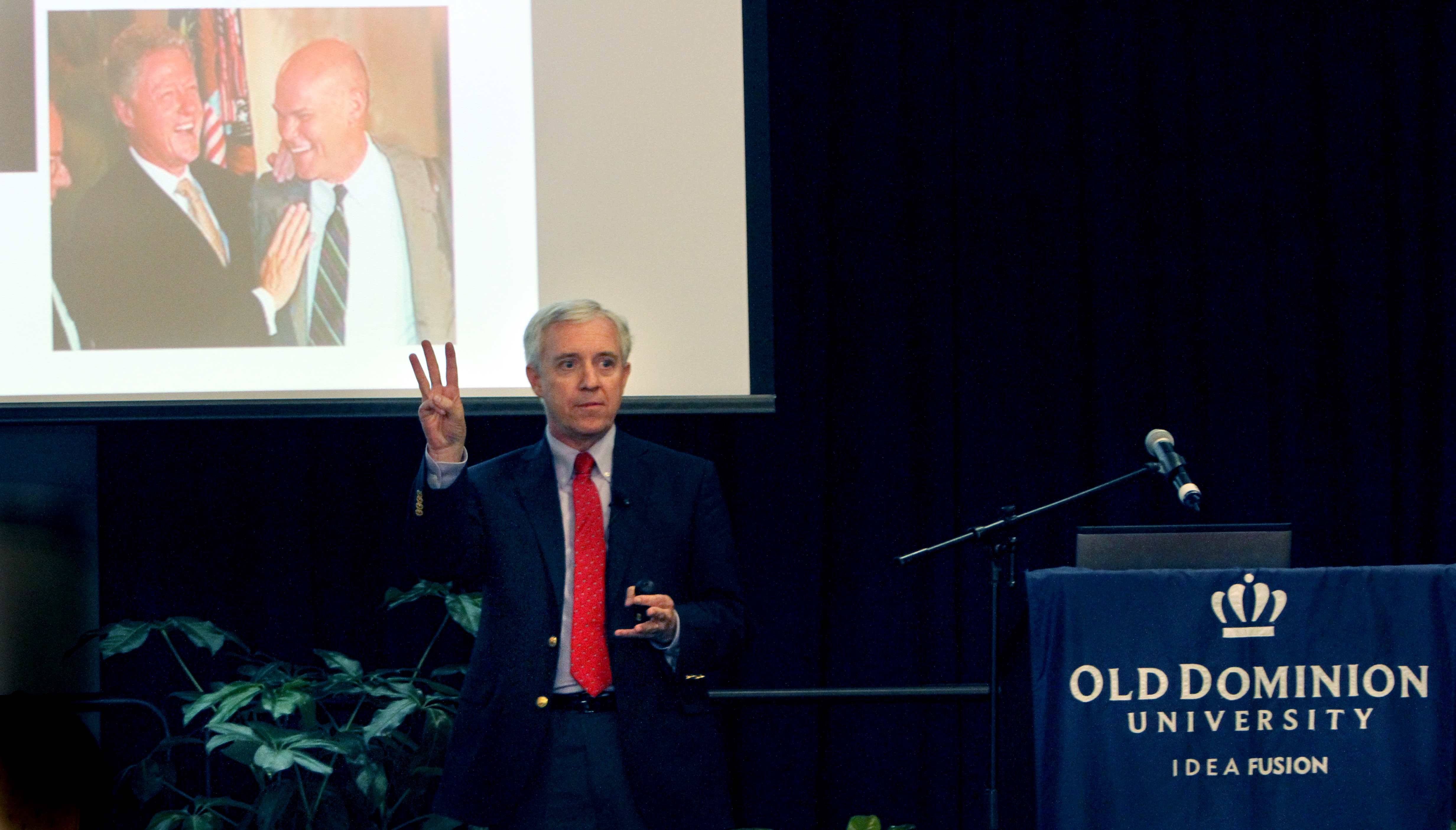
Old Dominion University President's Lecture Series presented David W. Titley, RADM USN (ret.); Senior Scientist, Department of Meteorology, Pennsylvania State University; Director, Center for Solutions to Weather and Climate Risk at Penn State.
|
|
[October 29, 2013] Paper on flood insurances published in Nature Climate Change: Diane Horn, University of London, and Michael McShane, ODU, are the authors of a commentary on flood insurances and their role in stimulating climate change adaptation that was published today in Nature Climate Change. See the article ...
|
|
[October 29, 2013] Naomi Klein: How science is telling us all to revolt: In an article in TheNewStatesman, Naomi Klein reports on scientific studies indicating that our relentless quest for economic growth is killing the planet. See the article ...
|
|
[October 26, 2013] Wendy Ring voiced concerns about the public health impacts of climate change: More than 50 participants listen to Wendy Ring of Climate 911, who presented convincing evidence of the many health impacts climate change is causing already today and a worrying perspective on what we might be exposed to if we are not successful in changing our lifestyle to one that could slow down climate change. Besides the importance of each individual taking all small steps to reduce our impact on the environment and climate, the subsequent panel discussion emphasized the need to put pressure on our governments to create a policy framework with incentives facilitating the necessary changes in lifestyle. The importance of education focusing on environmental health was underlined. Read more on the event page ...
|
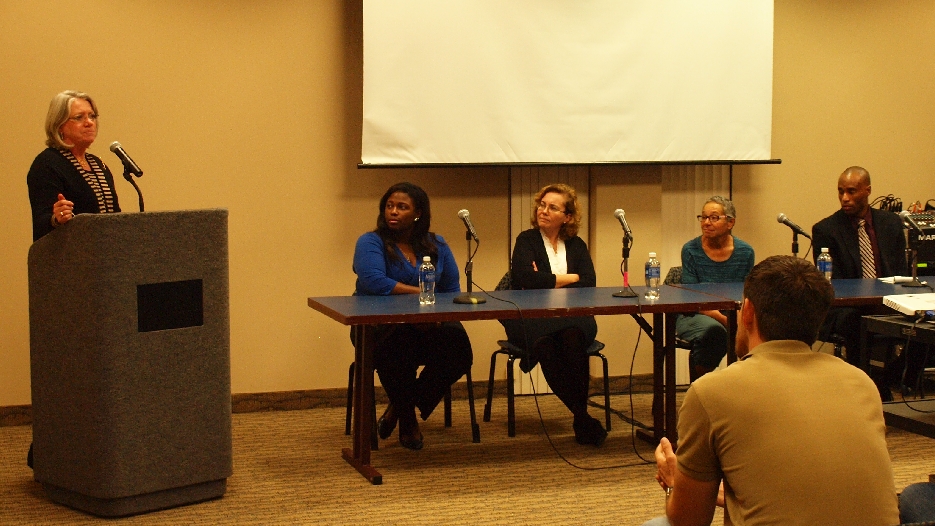
The panel discussion was moderated by Karen Remley, Founding Director, M. Foscue Brock Institute for Community and Global Health, Eastern Virginia Medical School. The panel members were (from left to right: Yvette Blai, M.S. Student at ODU and EVMS; Muge Akpinar-Elci, Director, Center of Global Health, ODU; Wendy Ring; and Dawone Robinson, Virginia policy coordinator, Chesapeake Climate Action Network.
|
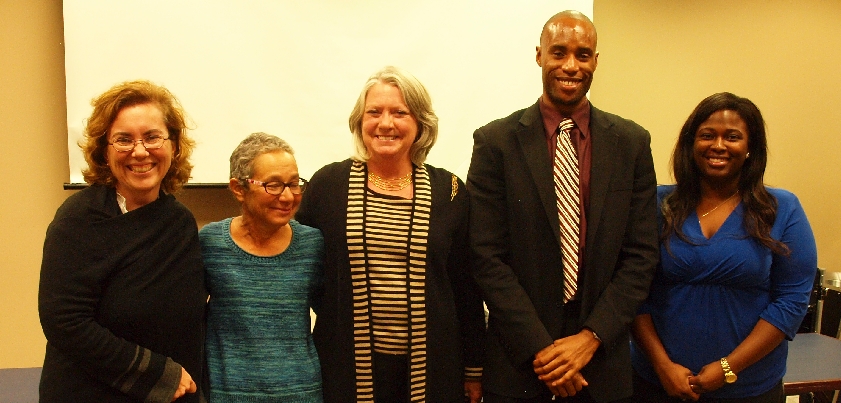
The Speaker and Panel members after the event (from left to right: Muge Akpinar-Elci; Wendy Ring; Karen Remley; Dawone Robinson; Yvette Blai, M.S. Student at ODU and EVMS).
|
|
[October 11, 2013] Conference material available for “Adaptive Planning For Flooding And Coastal Change In Virginia: Legal and Policy Issues For Local Government”: The documentation of the conference on “Adaptive Planning For Flooding And Coastal Change In Virginia: Legal and Policy Issues For Local Government” held on September 13, 2013 at the Virginia Coastal Policy Clinic (VCPC) at William & Mary Law School, Williamsburg. The forum was co-hosted by the Center for Coastal Resources Management (CCRM) at the Virginia Institute of Marine Science (VIMS). If you are interested in seeing the post-conference report, it can be found here (local copy). Presentation documents from the speakers (presentations, remarks and other documents) and conference videos can be found here.
You may also be interested in a new subcommittee on recurrent coastal flooding for the Secure Commonwealth Panel. The minutes from their first meeting can be accessed here.
|
|
[October 10, 2013] Several days with flooding events: A slowly moving low pressure off the coast of Virginia is causing a sequence of flooding events. See the documentation at floodings.
|
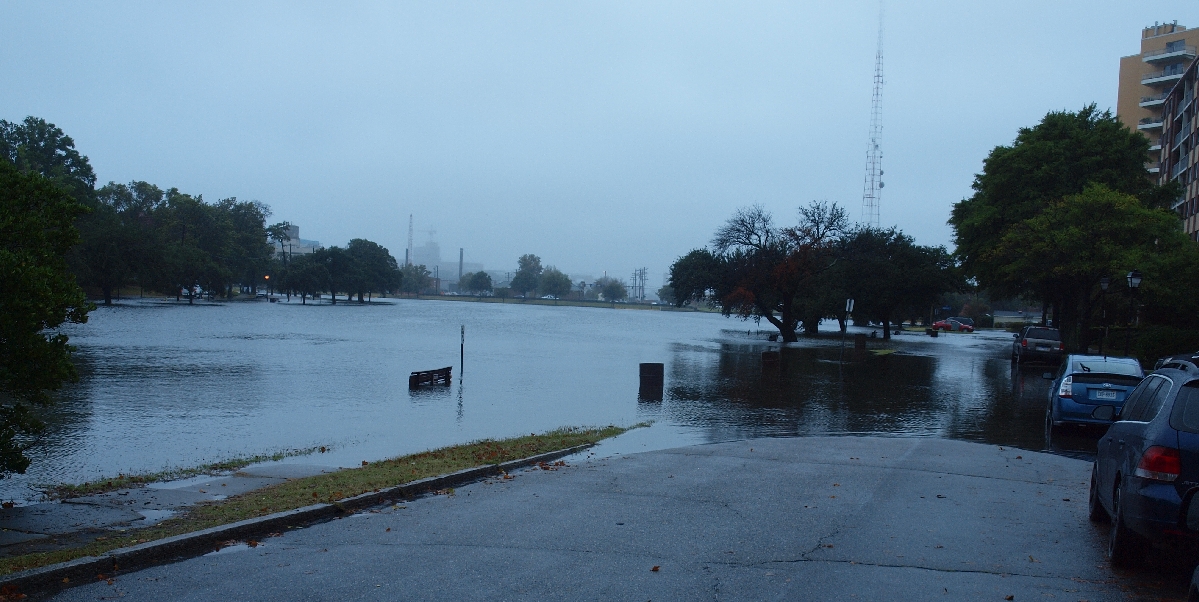 |
|
[October 9, 2013] CCAN Conference on Climate Adaptation: The “Safe Coast Virginia: A Community ActionConference on Climate Change, Energy and Adaptation will take place on November 16th, 2013, at Norfolk Botanical Garden, Rose Garden Hall, 9:30 AM to 4:00 PM. The event is organized by the Cheasapeake Climate Action Network. See the initial call here. To learn more or to register go to https://safecoastva-ccan1.eventbrite.com/.
|
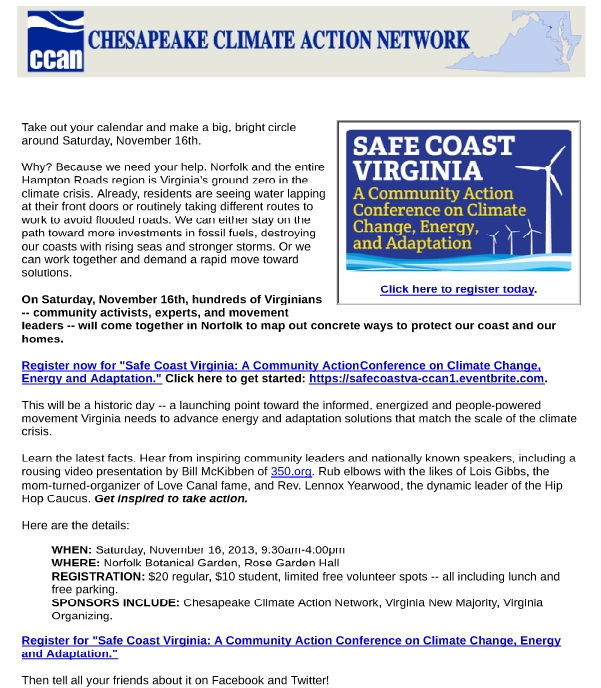
|
|
[October 8, 2013] Wendy Ring speaks at ODU: On October 25, 2013, Dr. Wendy Ring will speak at ODU on the health impacts of climate change and sea level rise. The presentation will be followed by a panel discussion on mitigation of public health impacts in Hampton Road. For full details, see the event page and the ODU announcement ...
|
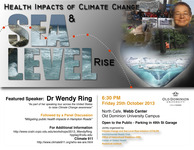
|
[September 19, 2013] Geo Science Congressional Visit Day: Hans-Peter Plag, Co-Director of the CCSLRI participated in the 2013 Geo Science Congressional Visit Day on September 18, 2013 together with other science representatives from Virginia. In four meetings with staff members of Representative Robert Scott, Senator Mark Warner, Senator Tim Kaine, and Representative Morgan Griffith, he emphasized the importance of research in support of sea level rise adaptation in Hampton Roads. A leaflet on the sea level rise challenge was passed on to each of the staffers. See the schedule or download the leaflet ...
|
[August 9, 2013] Faculty of Practice position at the CCSLRI: The CCSLRI at ODU has announced the position of a Faculty of Practice in Climate Change Resilience and Adaptation. Applications are due on 1 September 2013. See the local Announcements or down-load pdf ...
|
|
[July 18, 2013] Post-doc position at the CCSLRI: The CCSLRI at ODU has announced the position of a Post-Doctoral Research Associate with a focus on decadal sea level forecasts. Applications are due on 1 September 2013. See the local Announcements or the add at Higher Ed Jobs ...
|
|
[July 15, 2013] Scientists Unveil New Projections for Sea Level Rise in Maryland: A panel of scienctific experts prepared a new report on future sea level rise in Maryland for Gov. Martin O'Malley. The likely sea level rise for 2050 and 2100 was adjusted to higher numbers than those included in a report prepared in 2008. Read the full story and watch a video ...
|
|
[July 1, 2013] ACCESS-EU Conference announced: The Climate Change and Sea Level Rise Initiative (CCSLRI) at Old Dominion University is organizing the conference “Transatlantic Solutions to Sea Level Rise Adaptation: Moving Beyond the Threat” as part of the ACCESS-EU project. The conference will take place on October 30-31, 2013 on the campus of the Old Dominion University in Norfolk, Virginia. Read more ...
|
|
[June 30, 2013] James Balog at the AGU Science Policy Conference: James Balog, the man behind the award-winning documentary "Chasing Ice," spoke about the impacts we have on our home planet and how dire our future will be because of these impacts. See the presentation available on AGU's Video-On-Demand page ...
|































